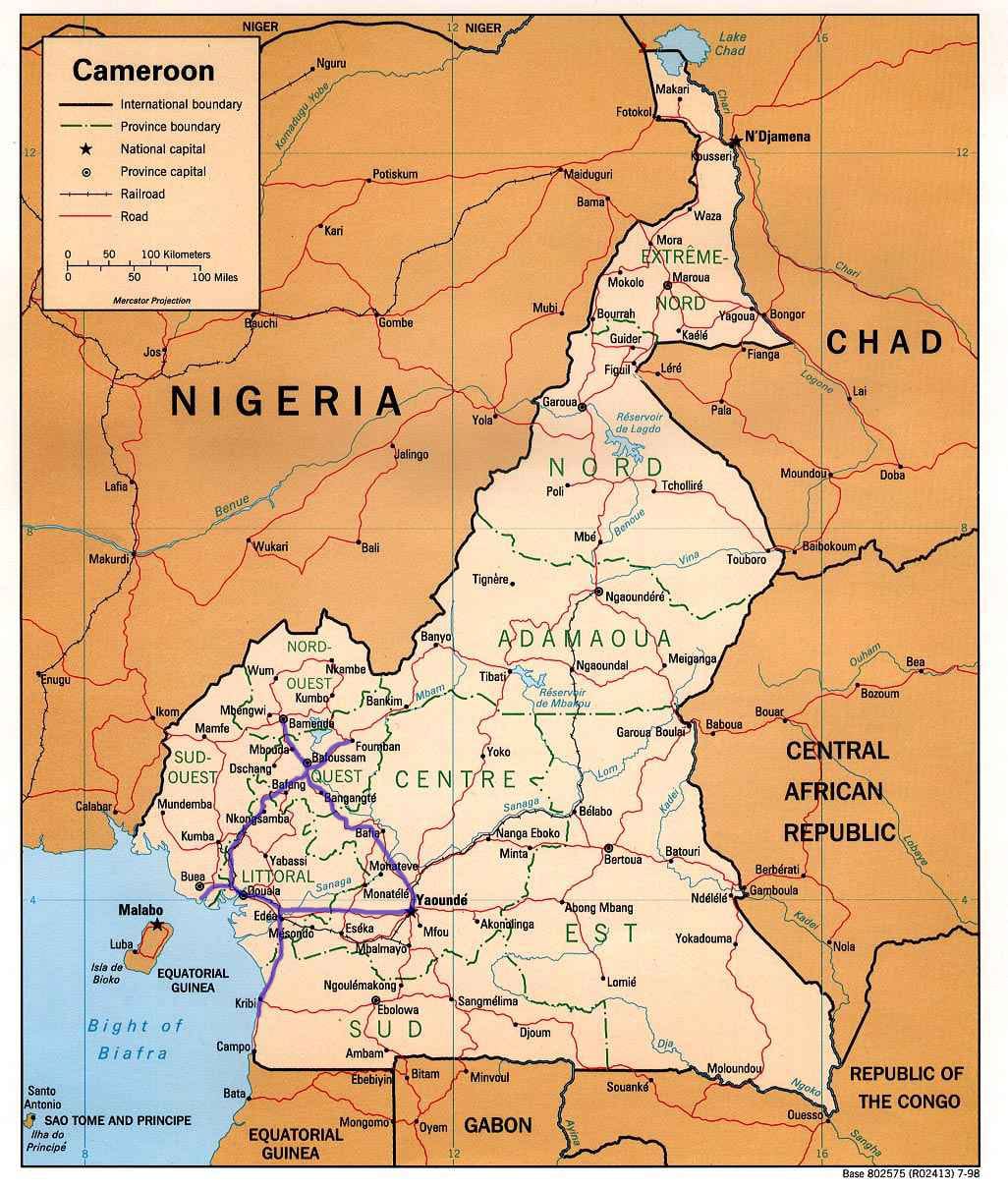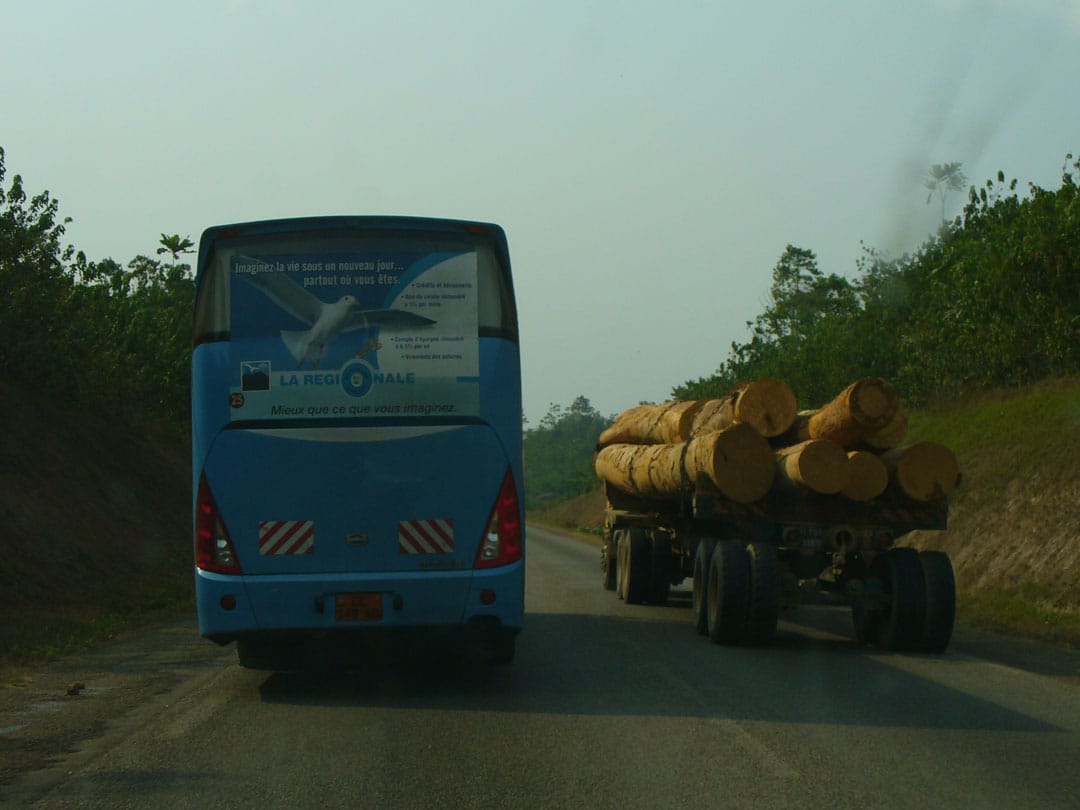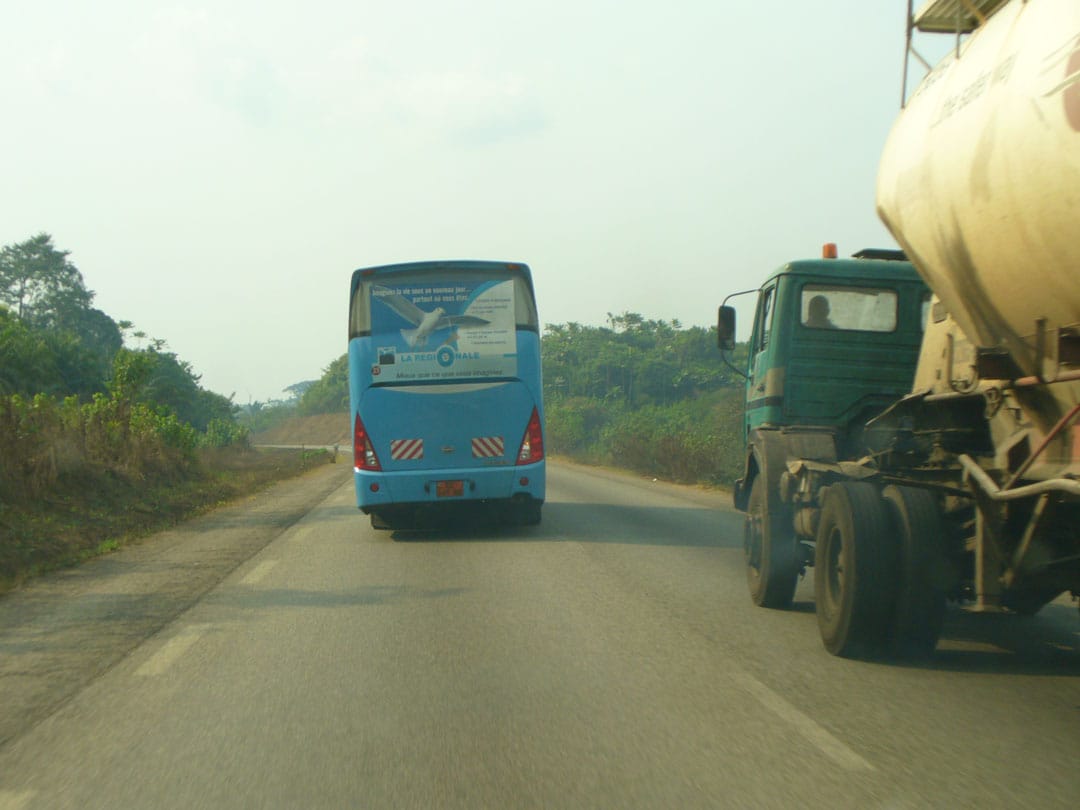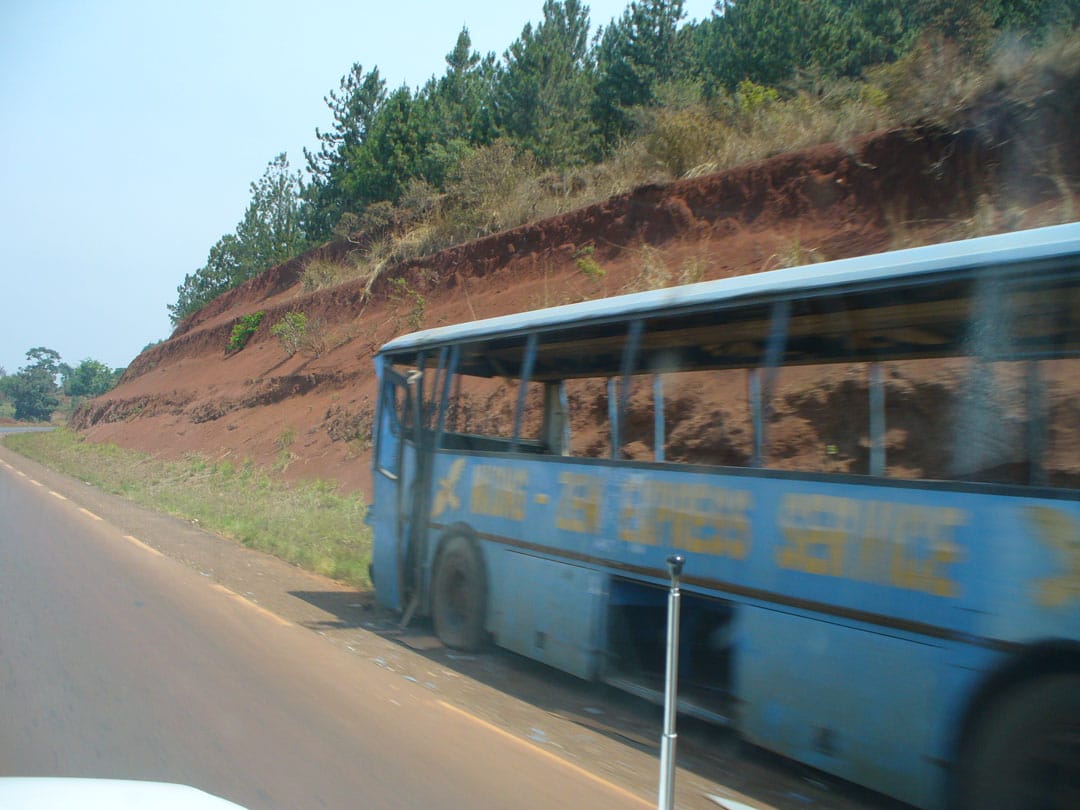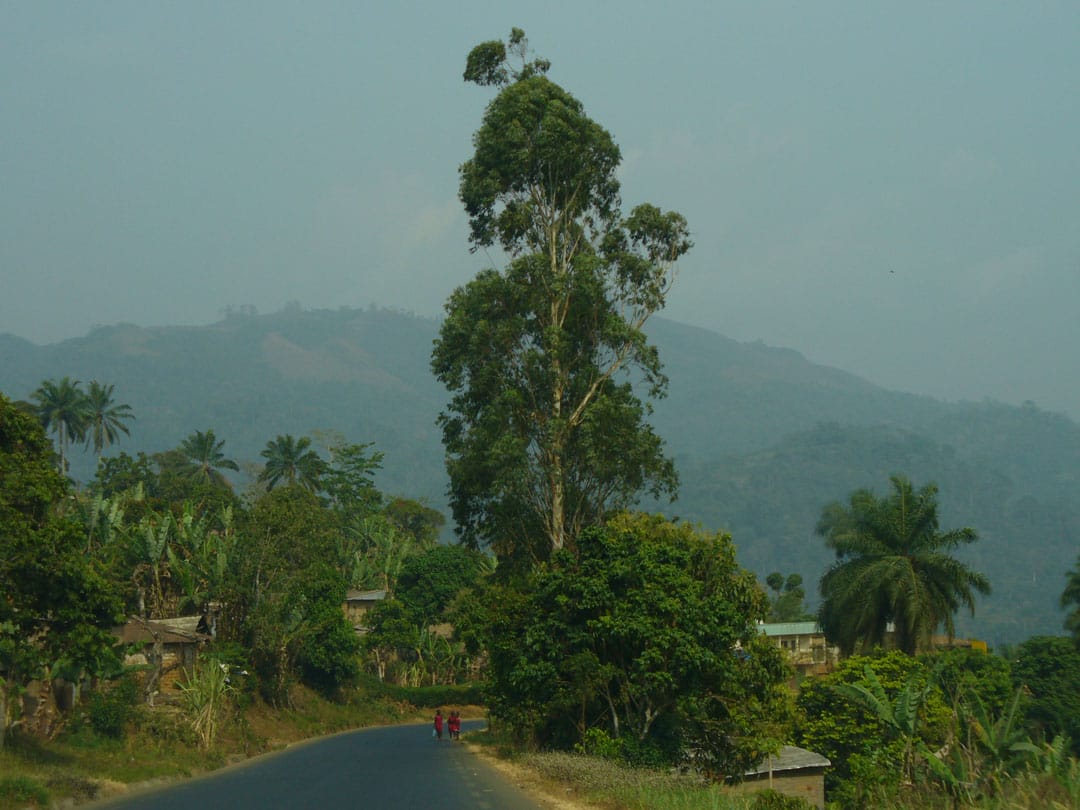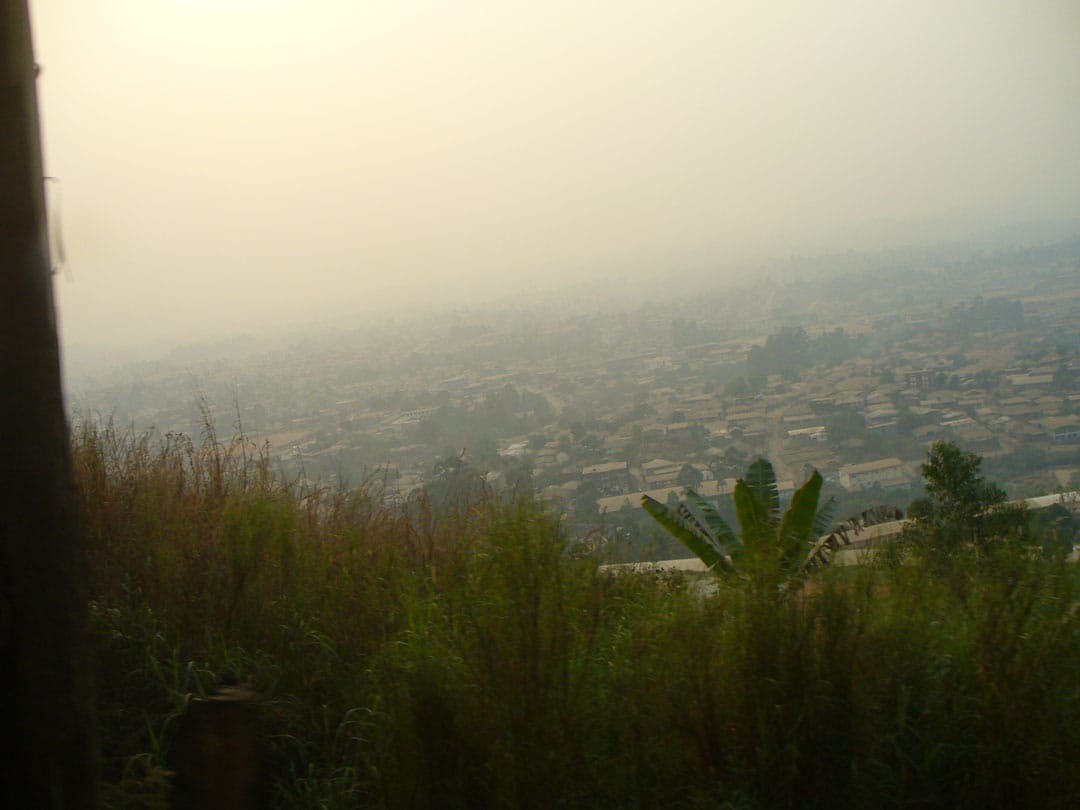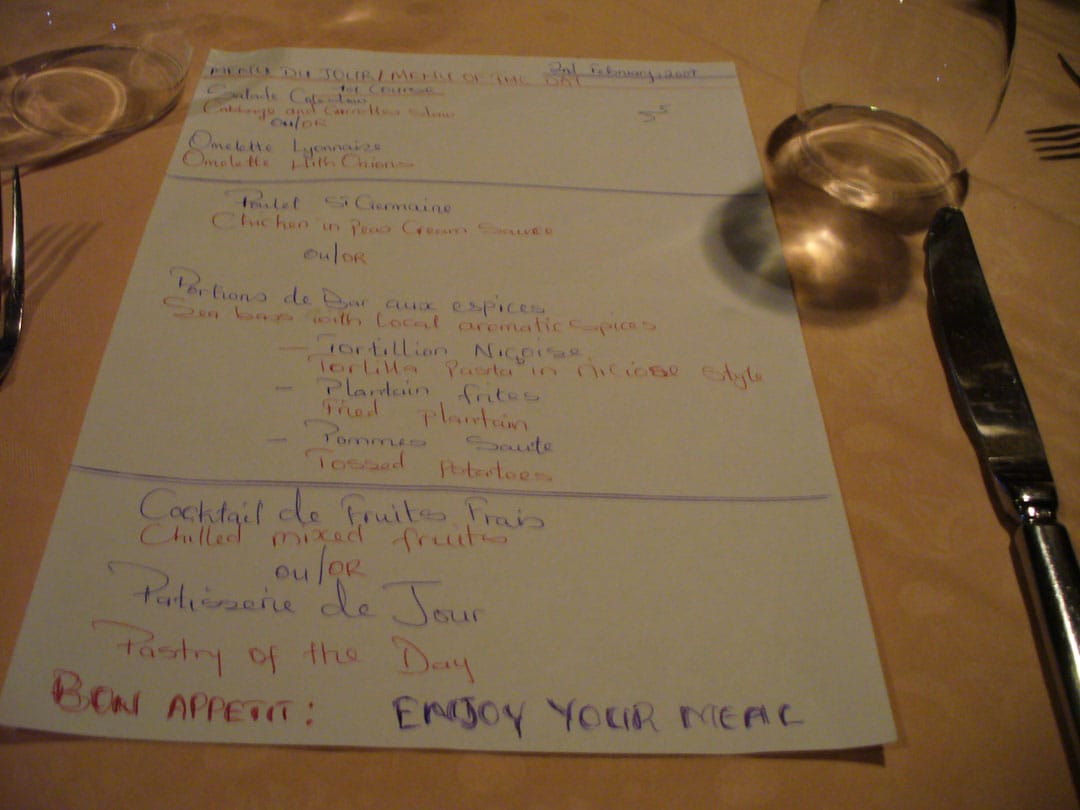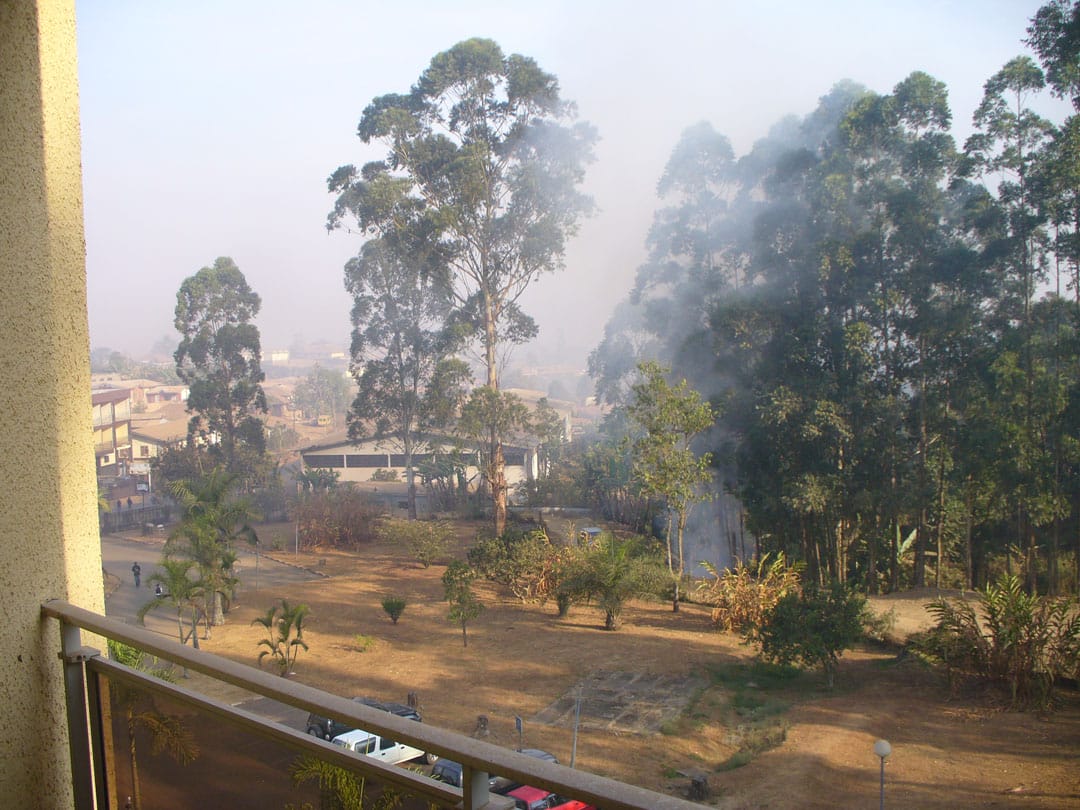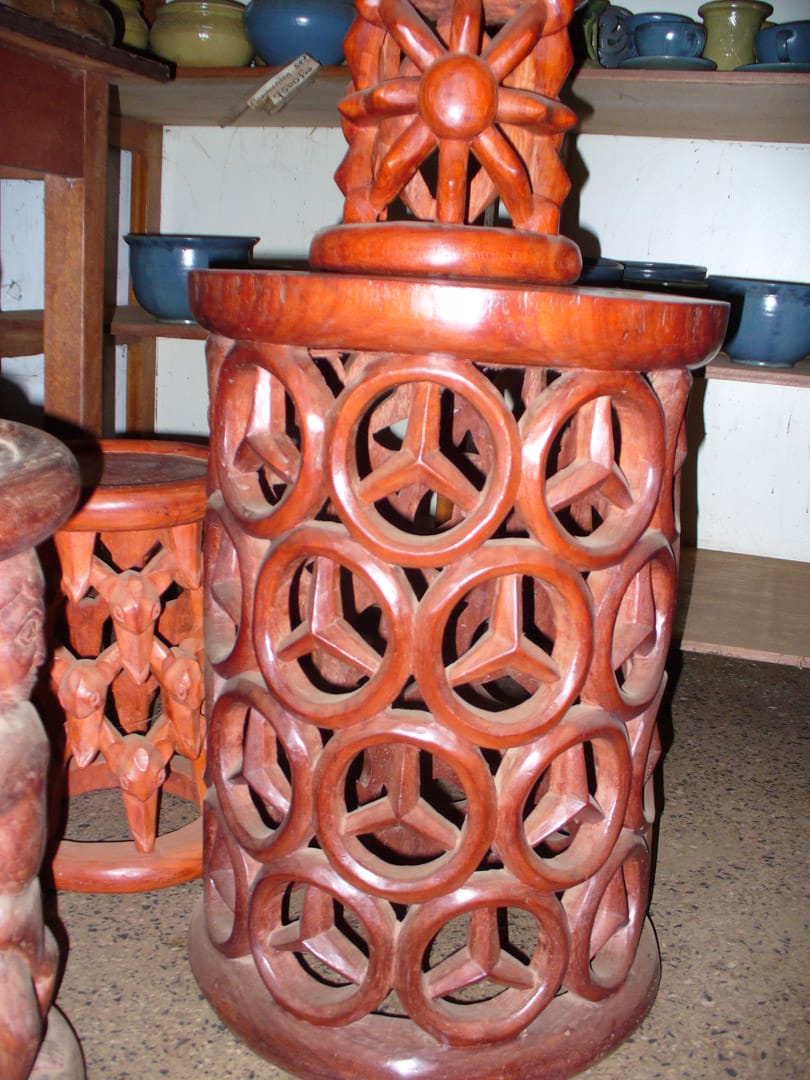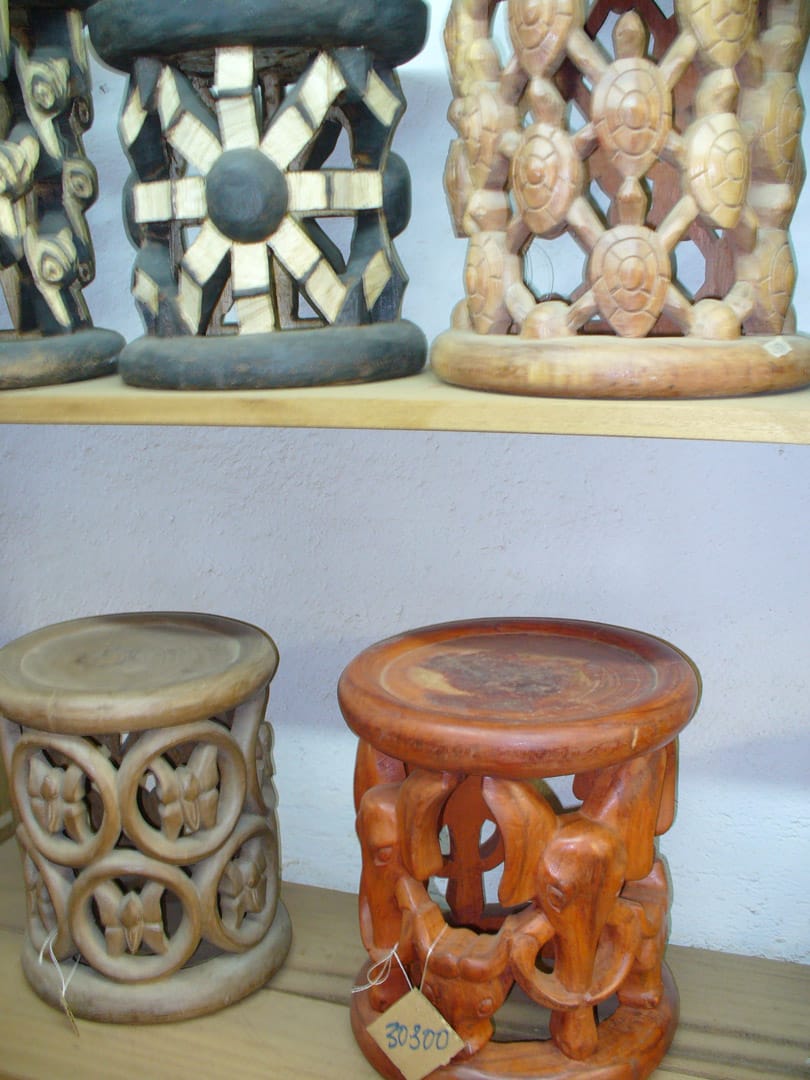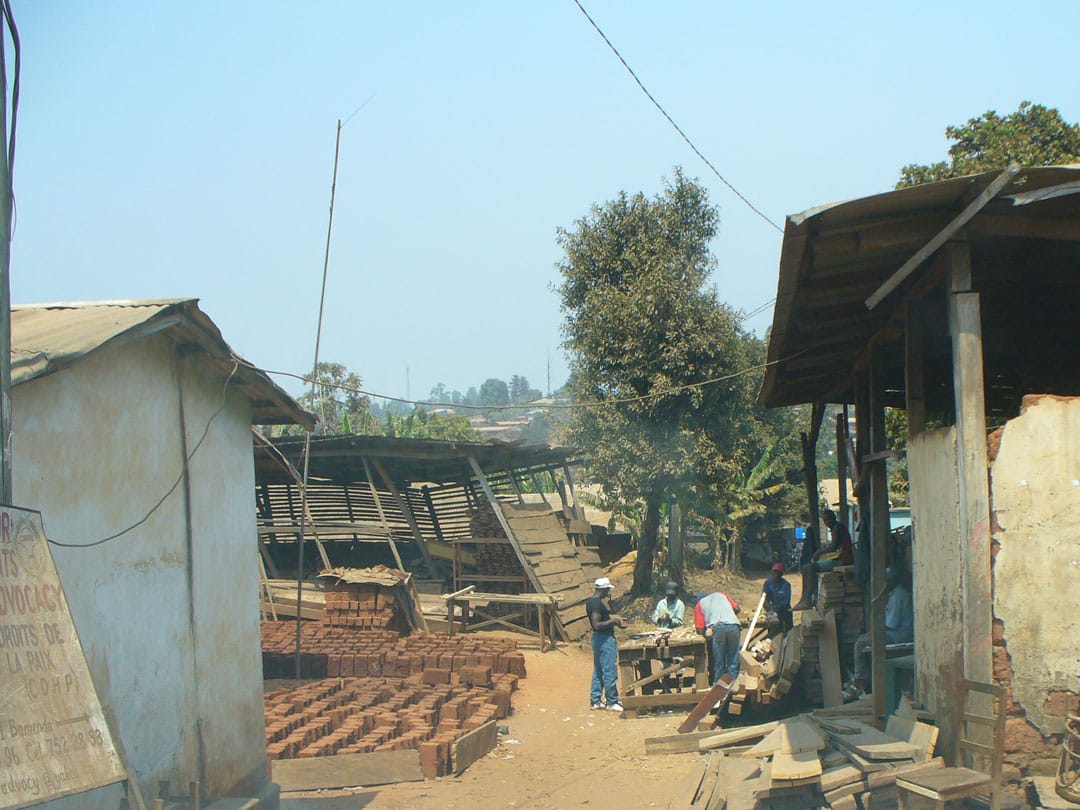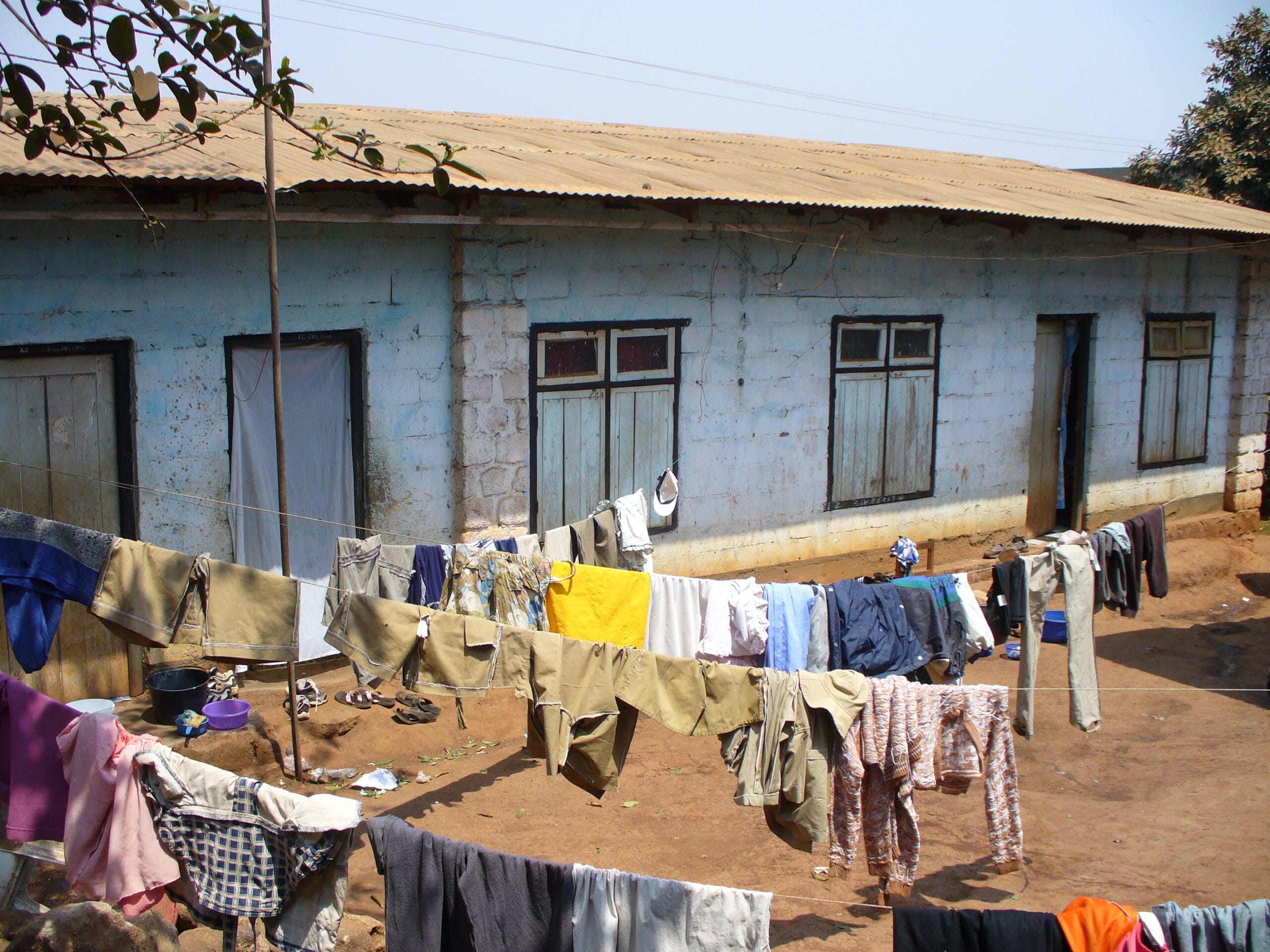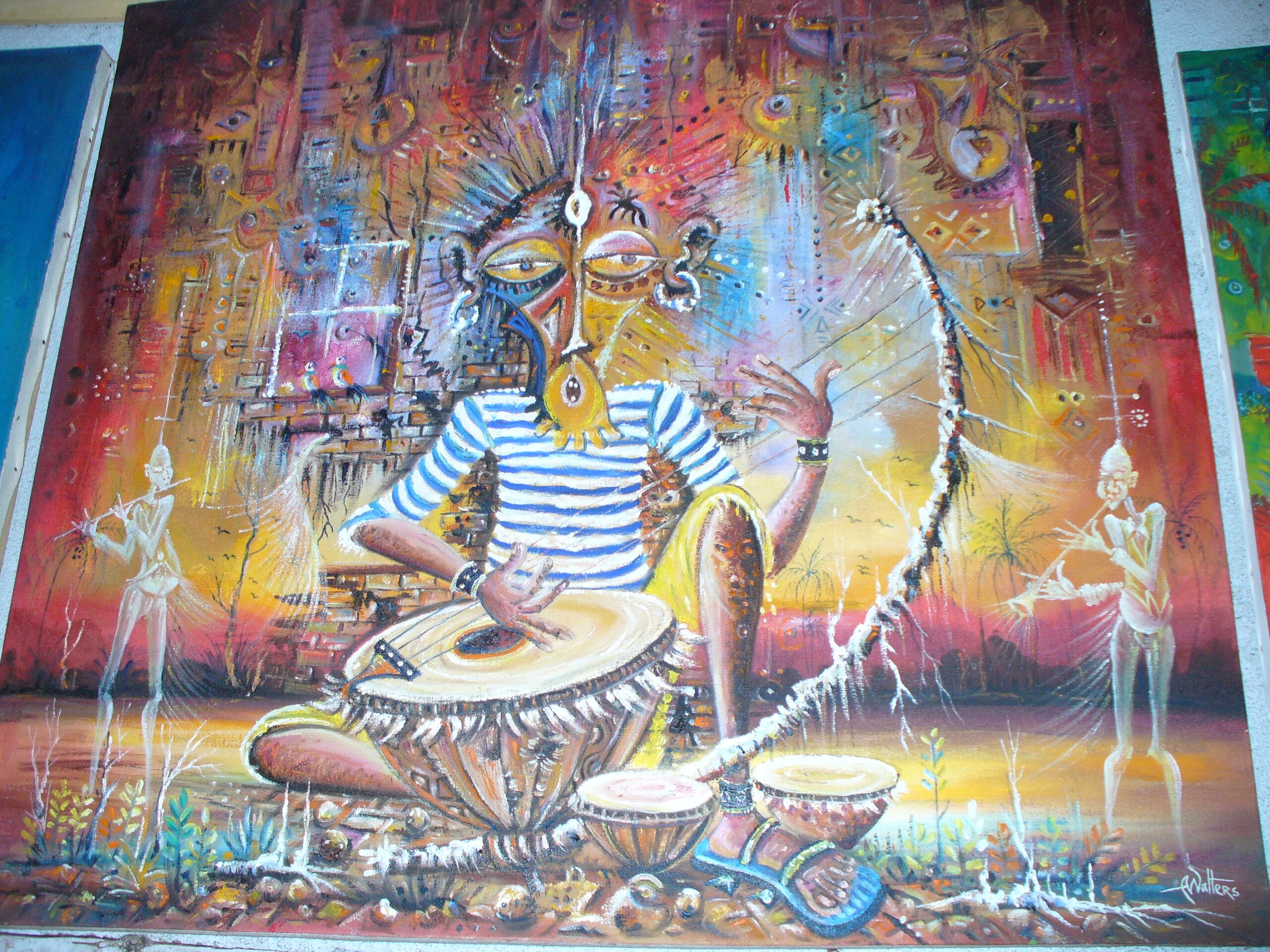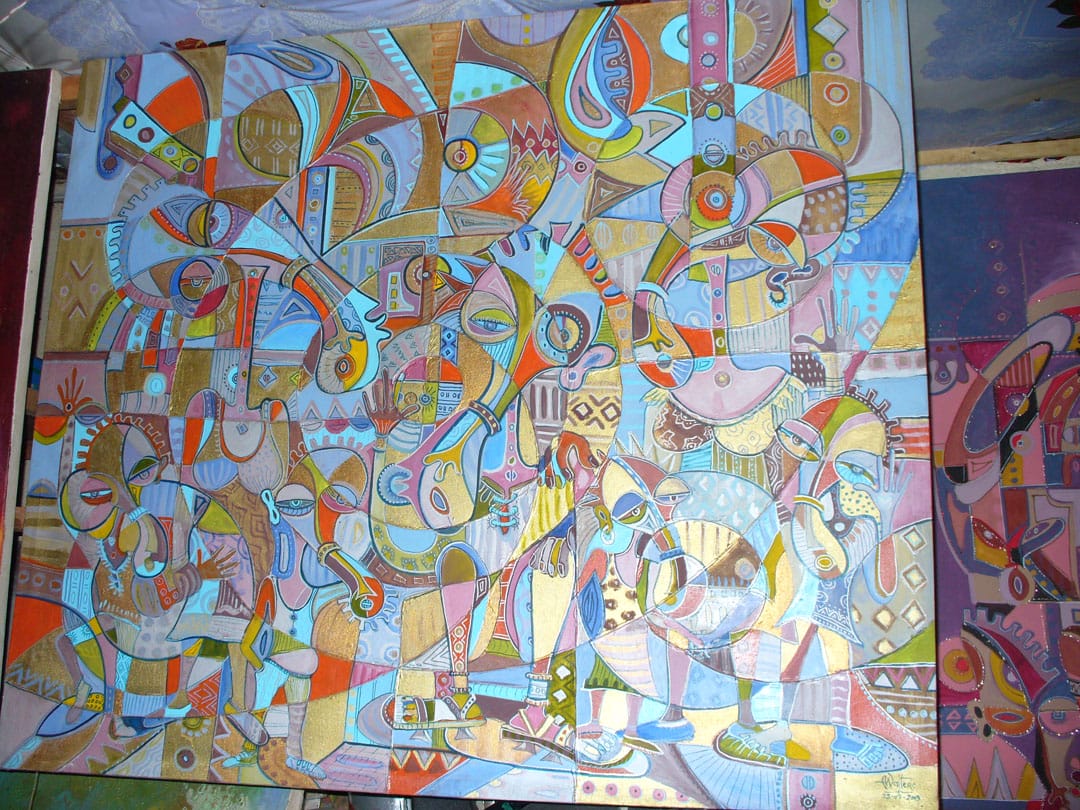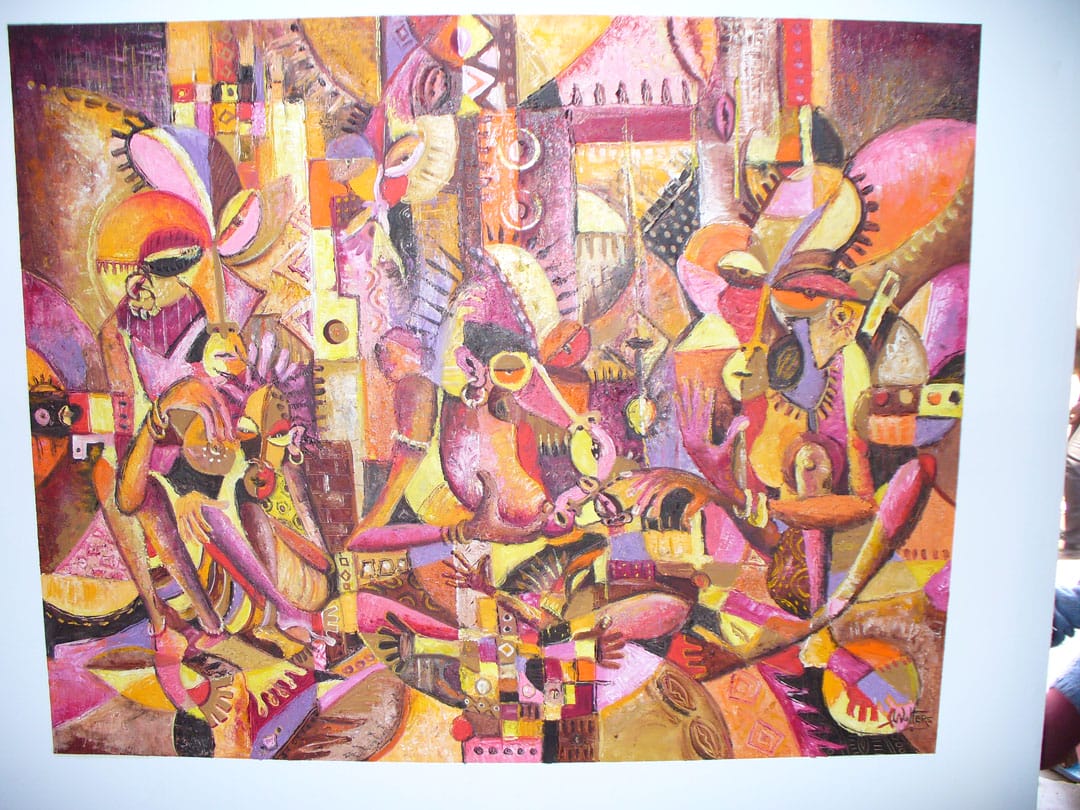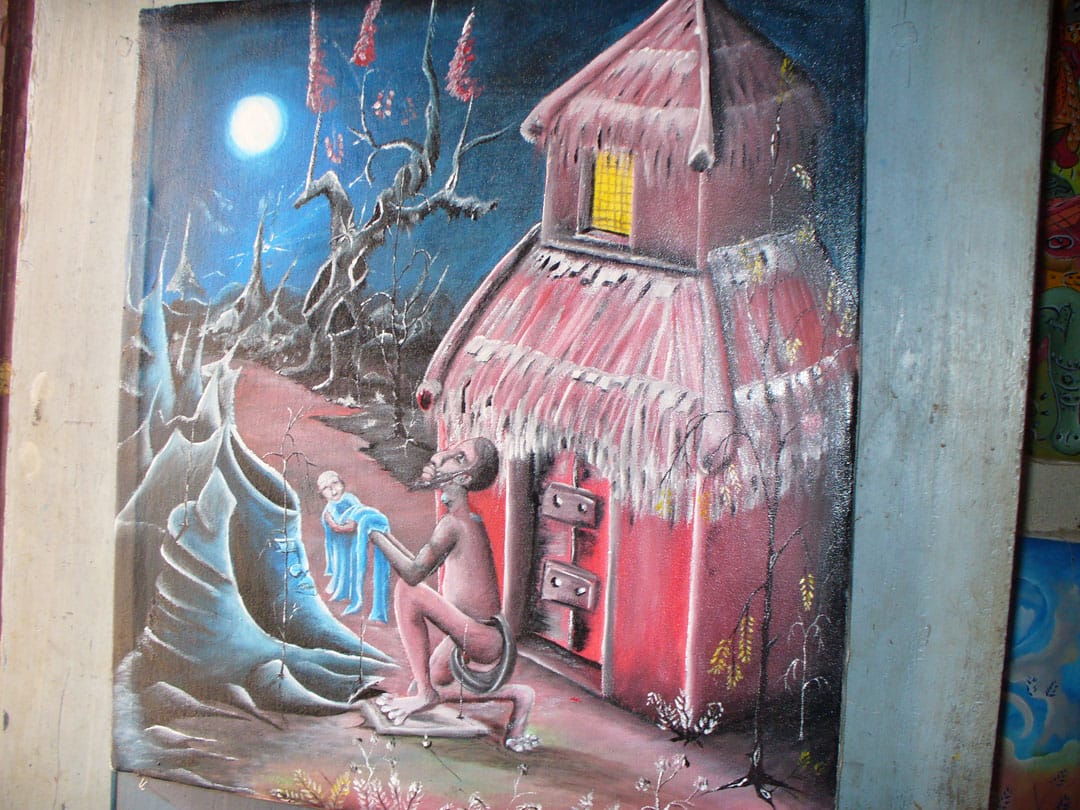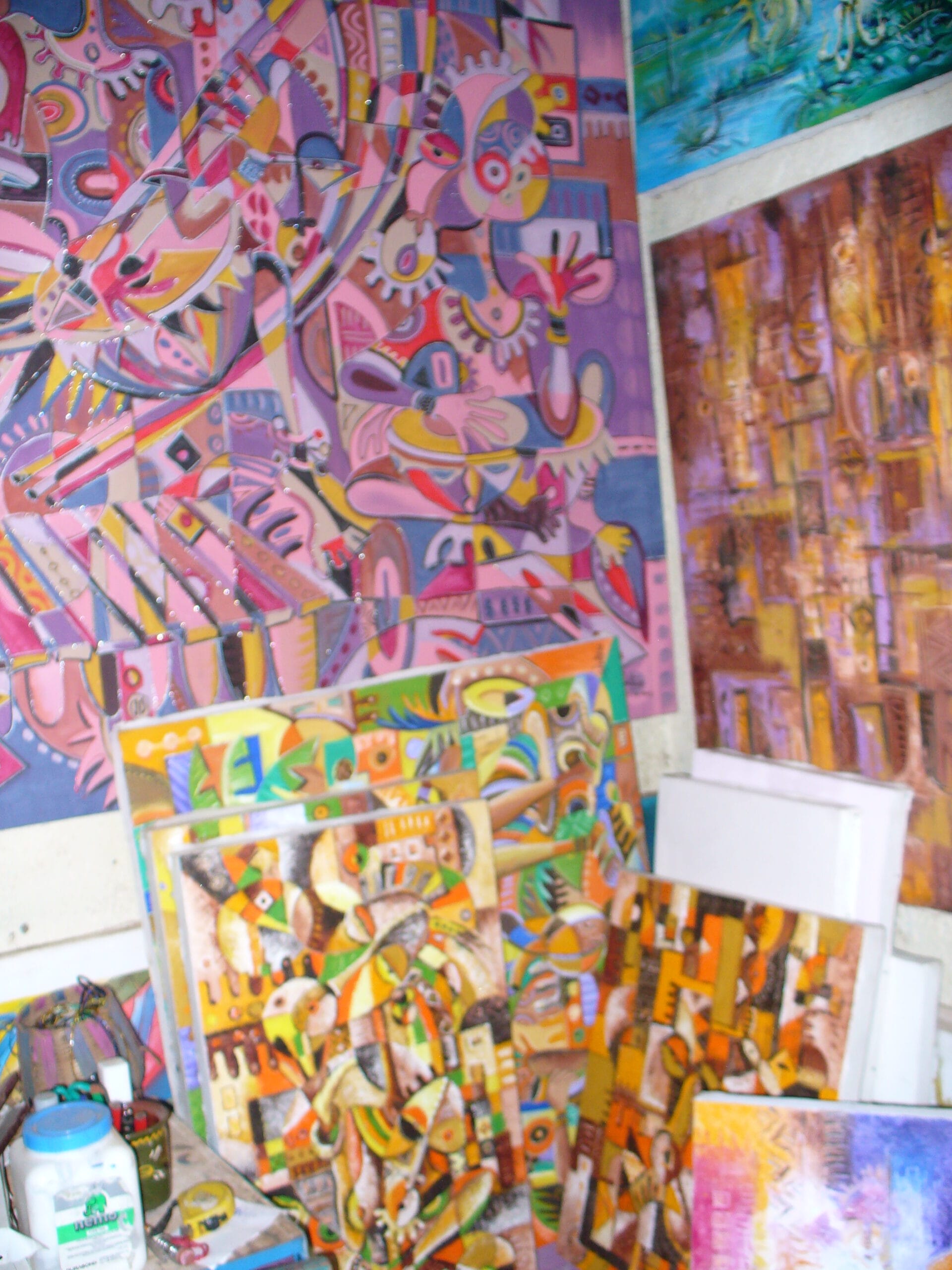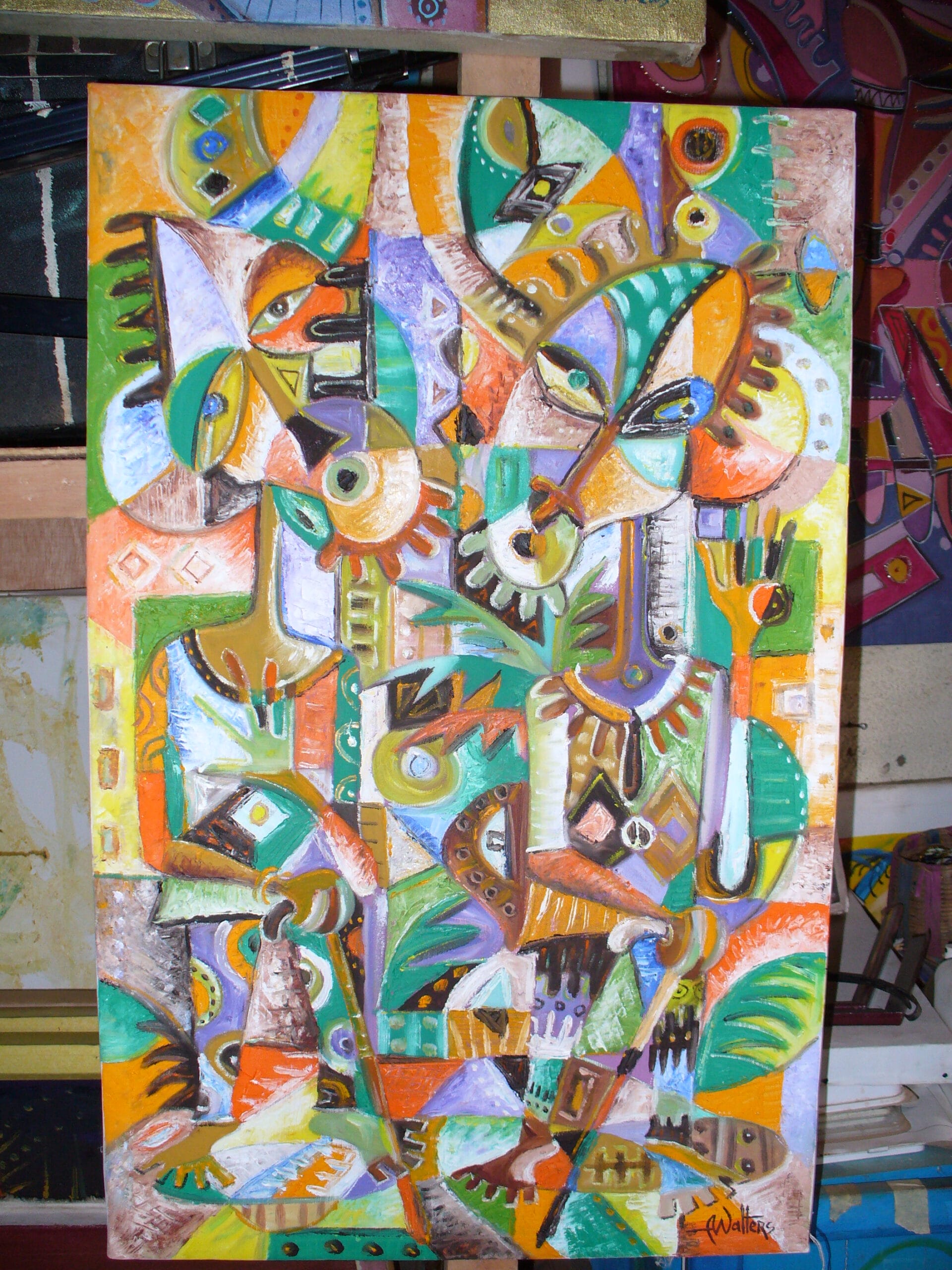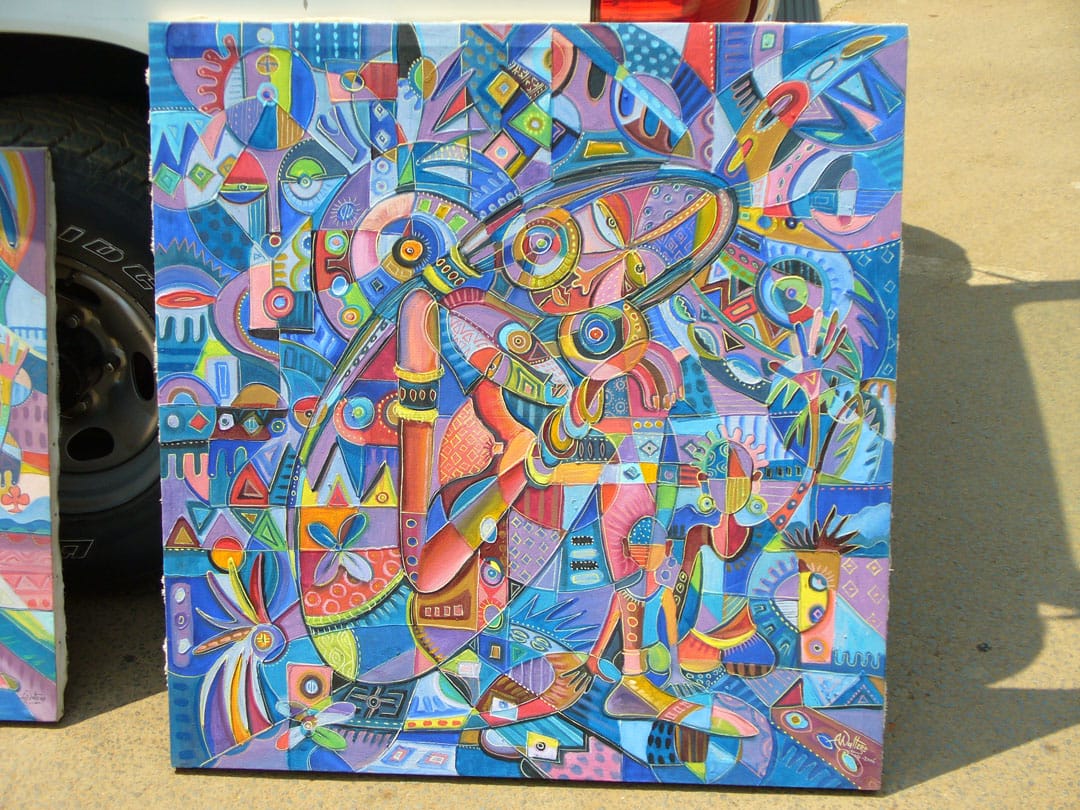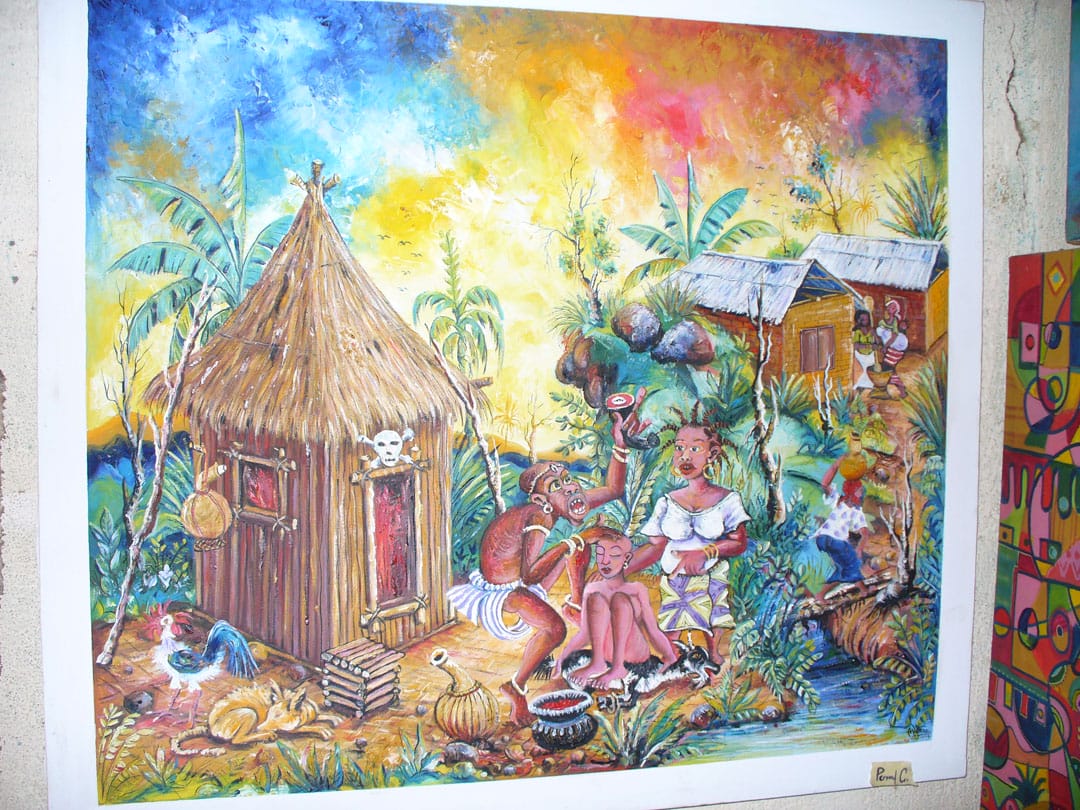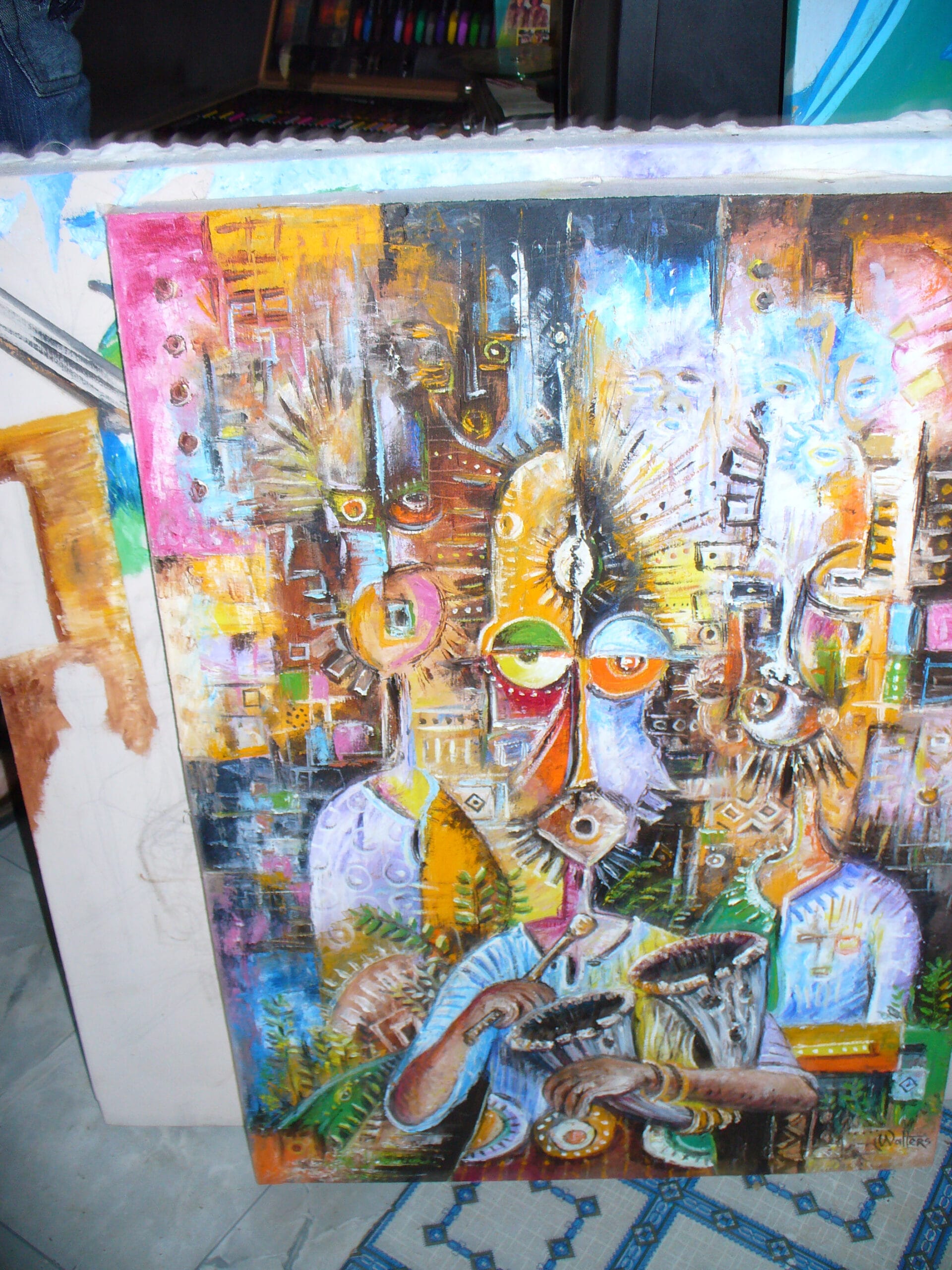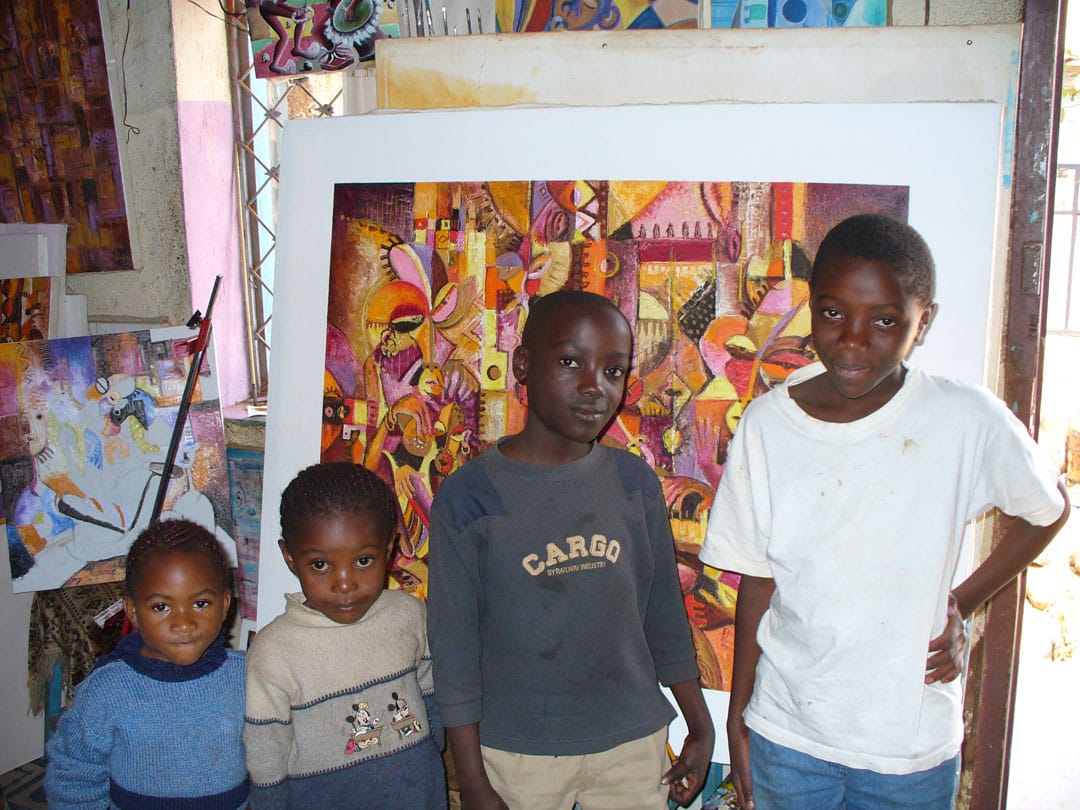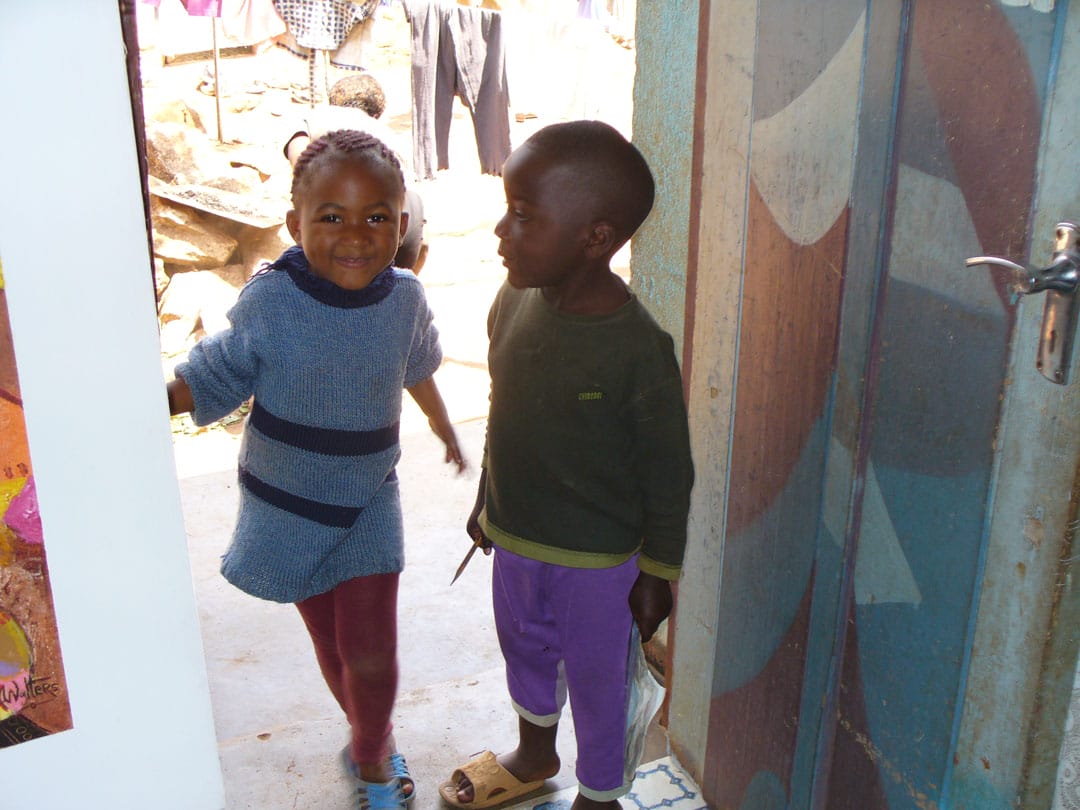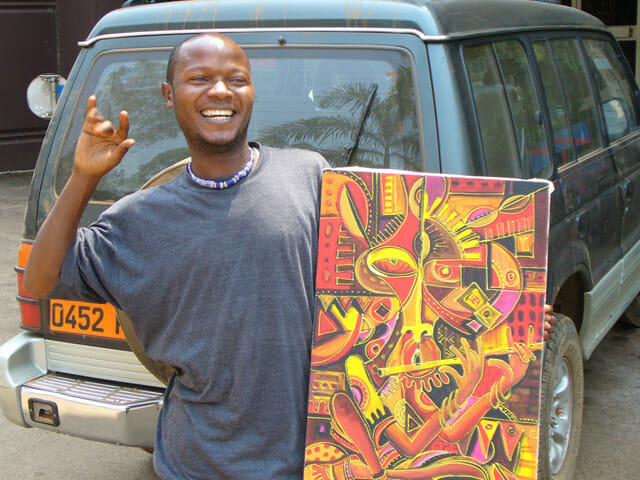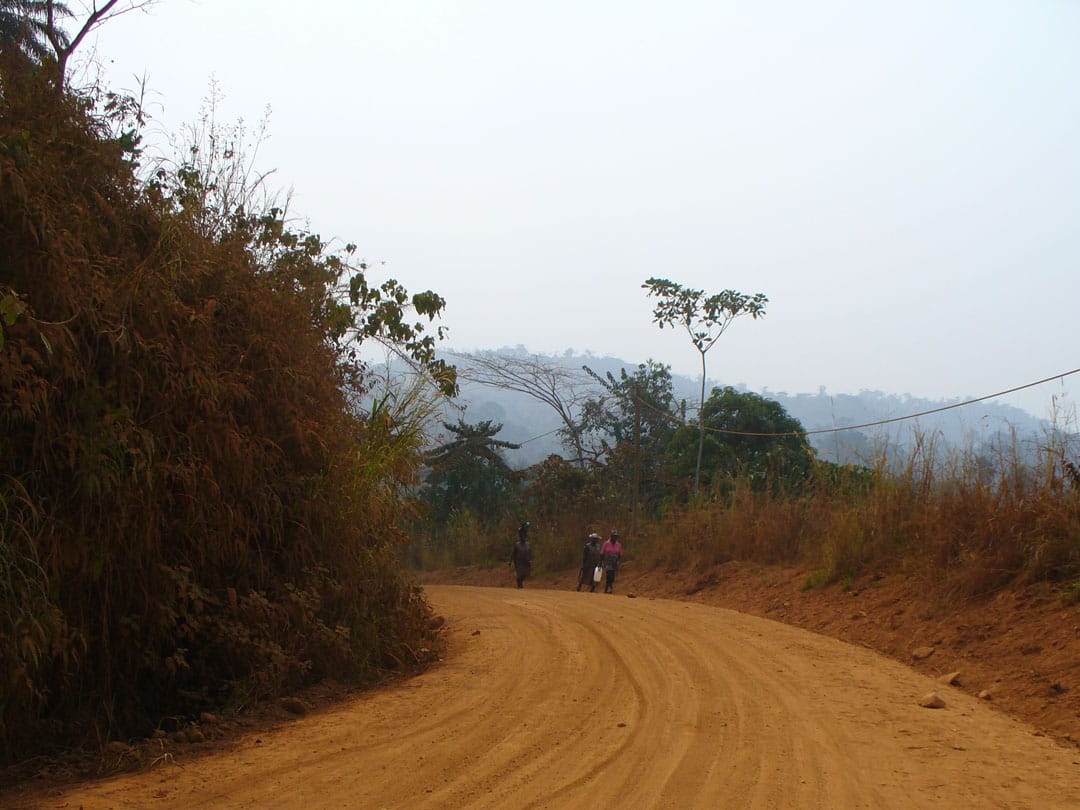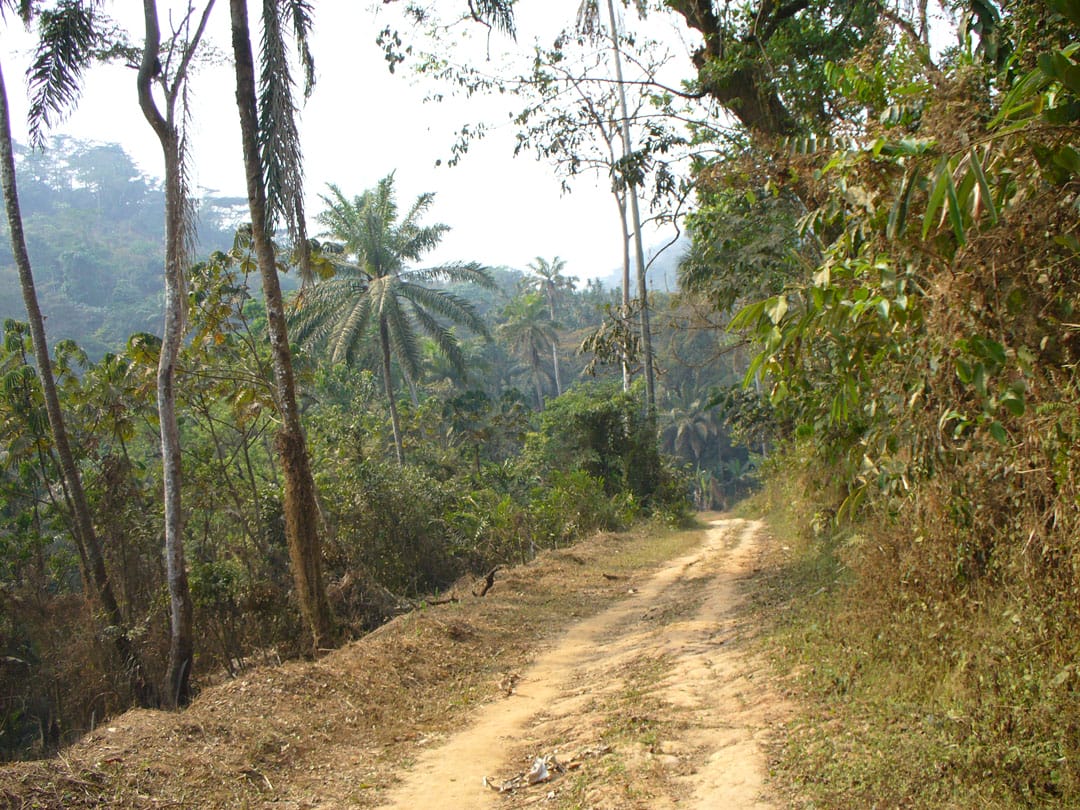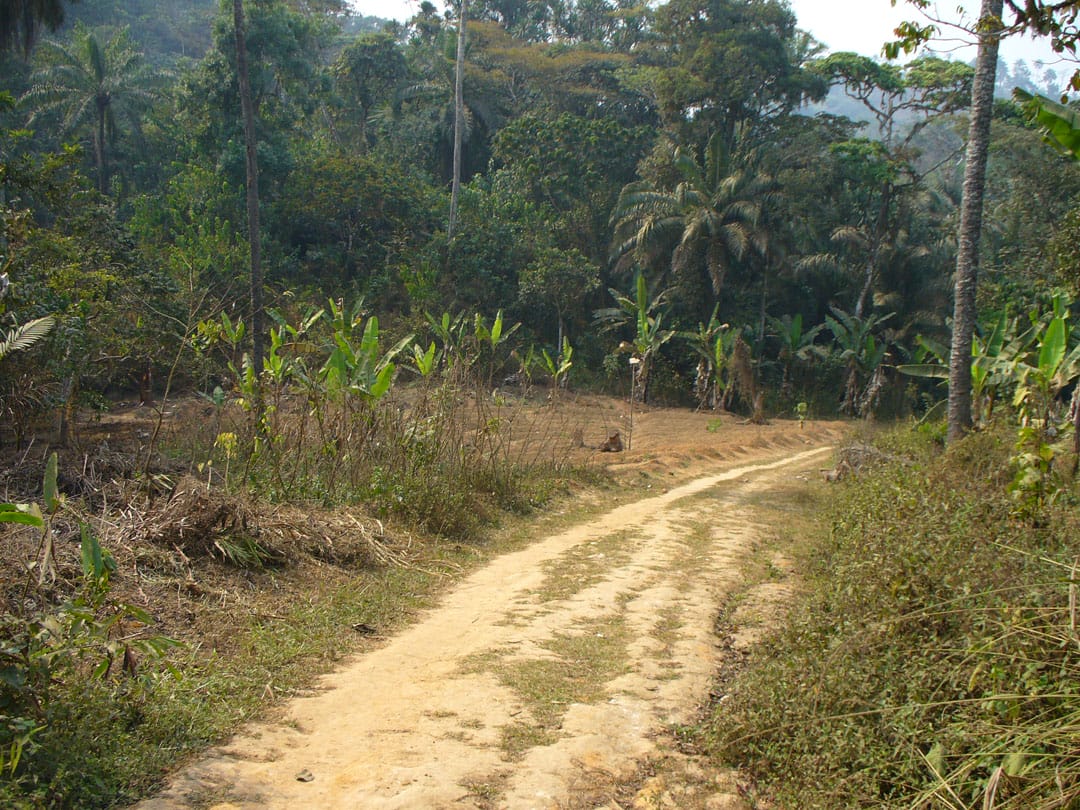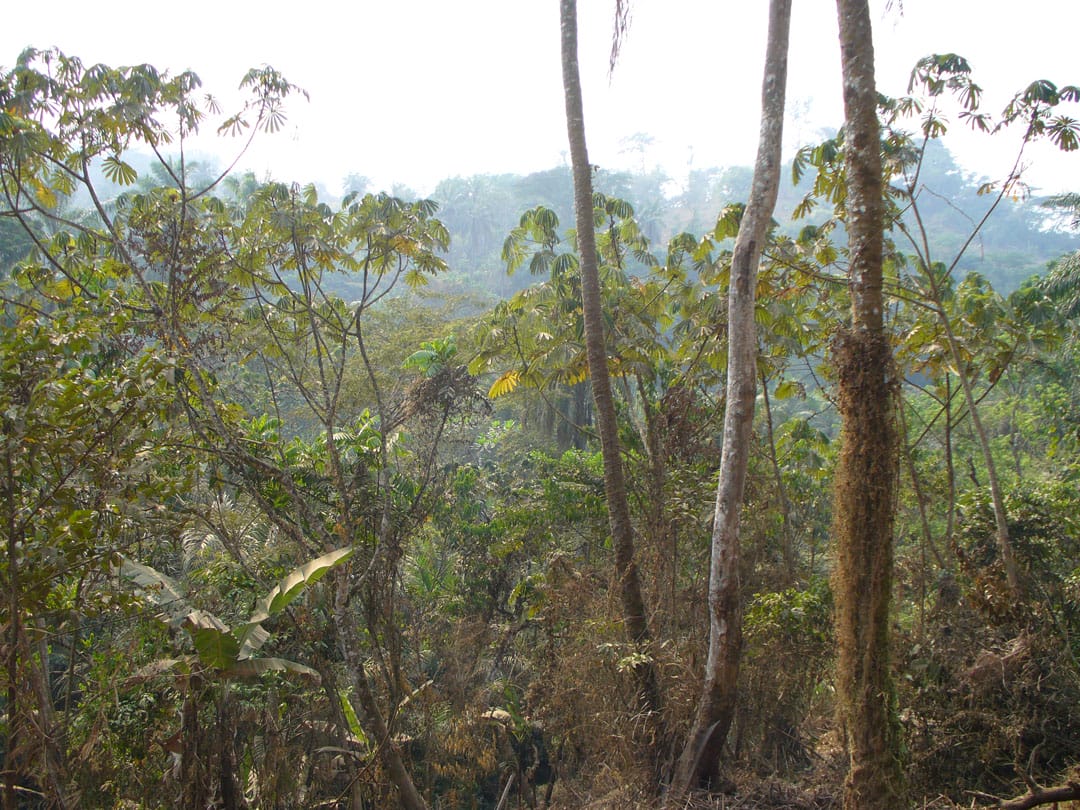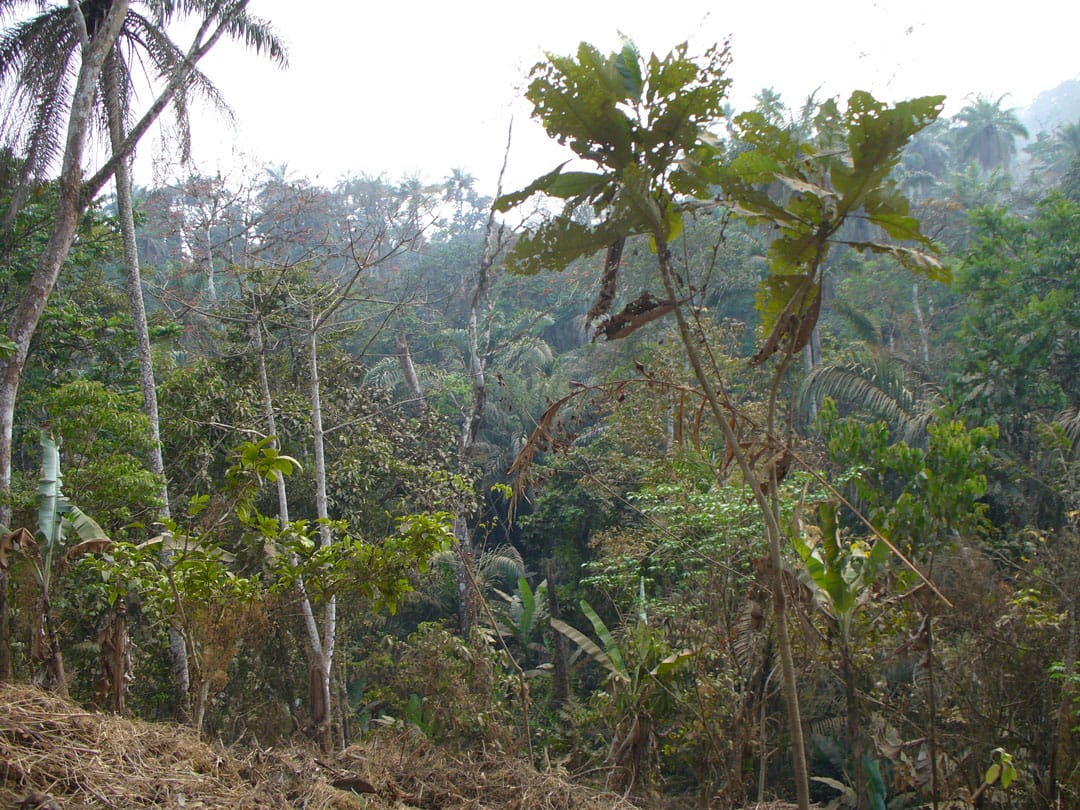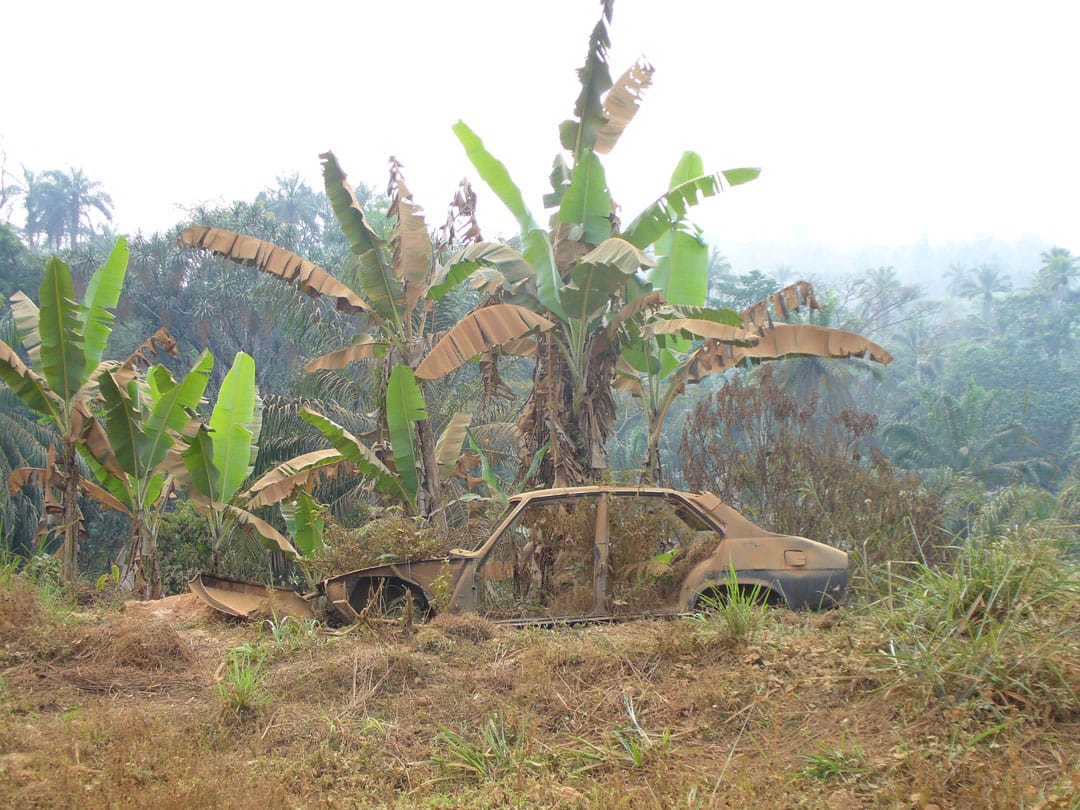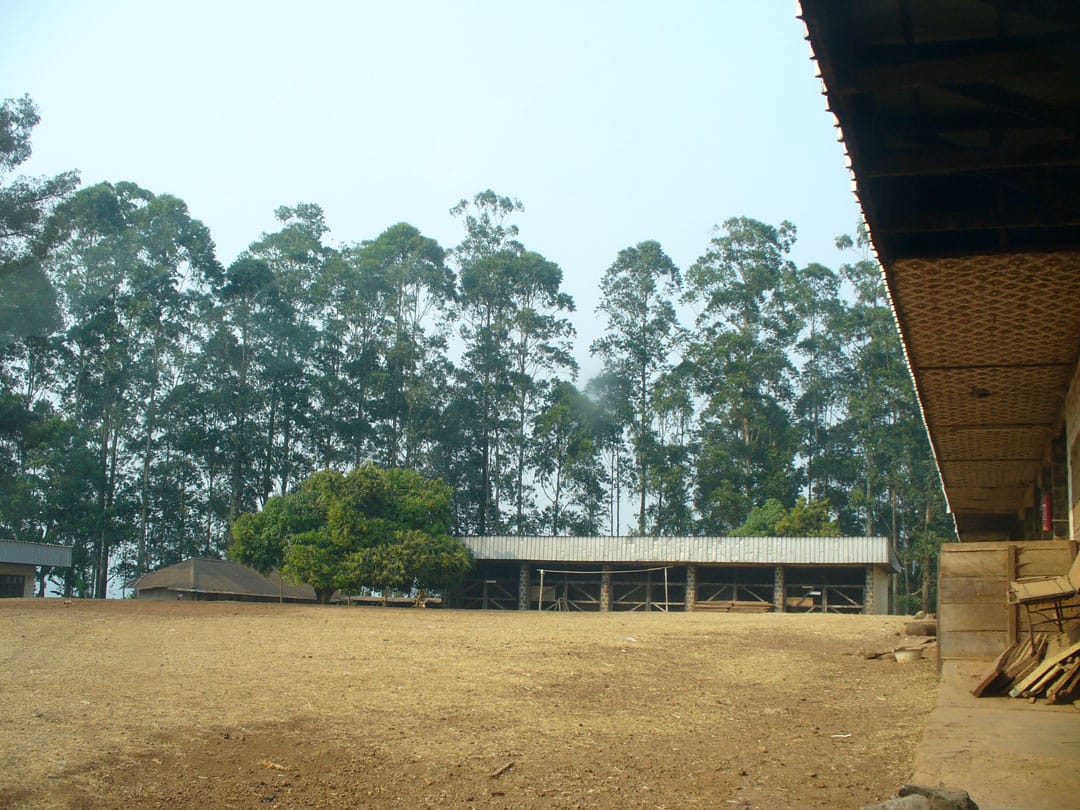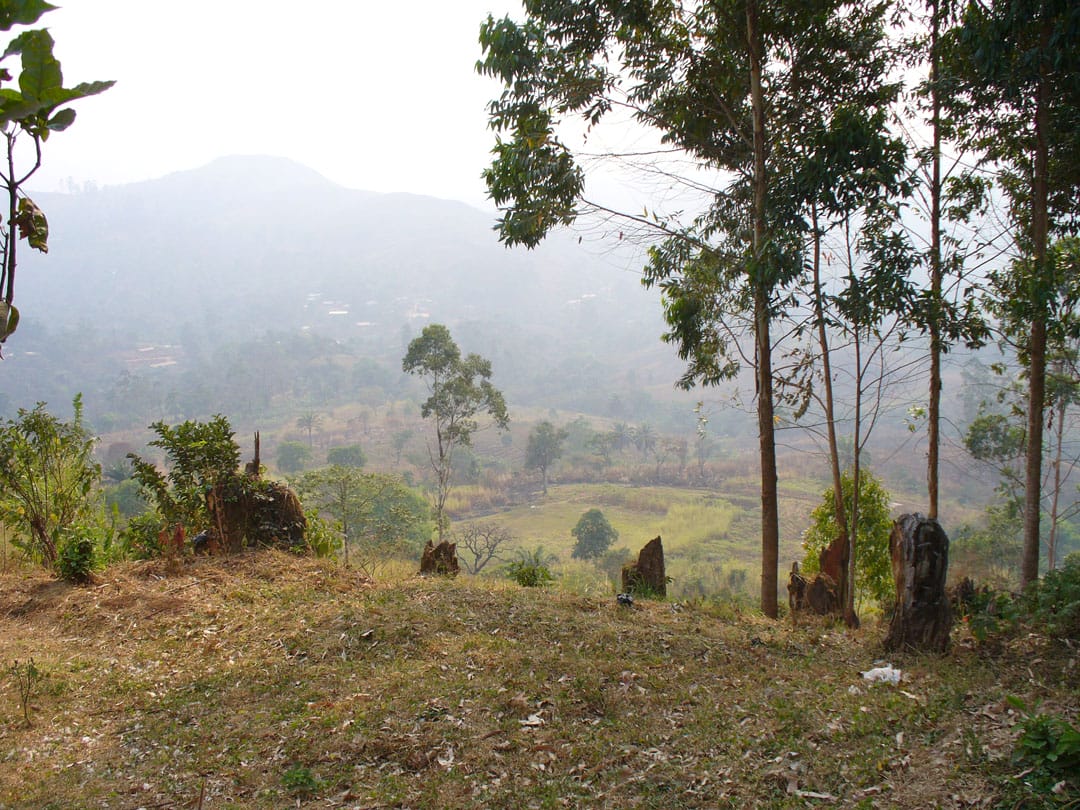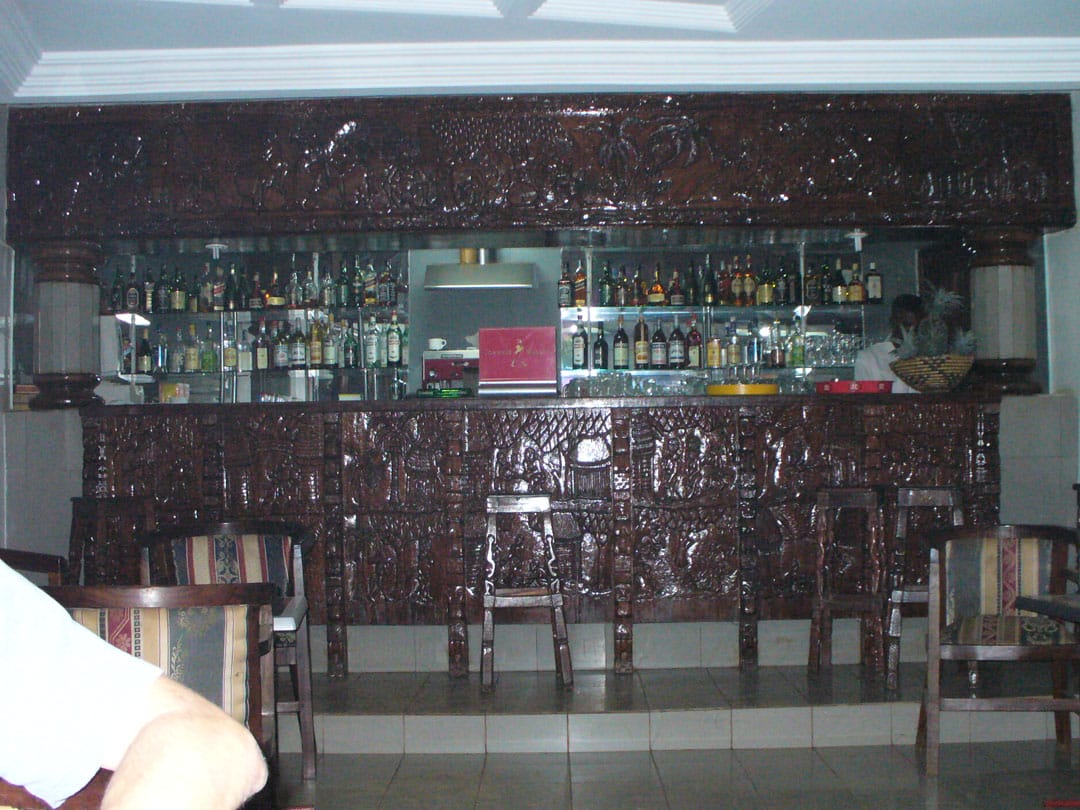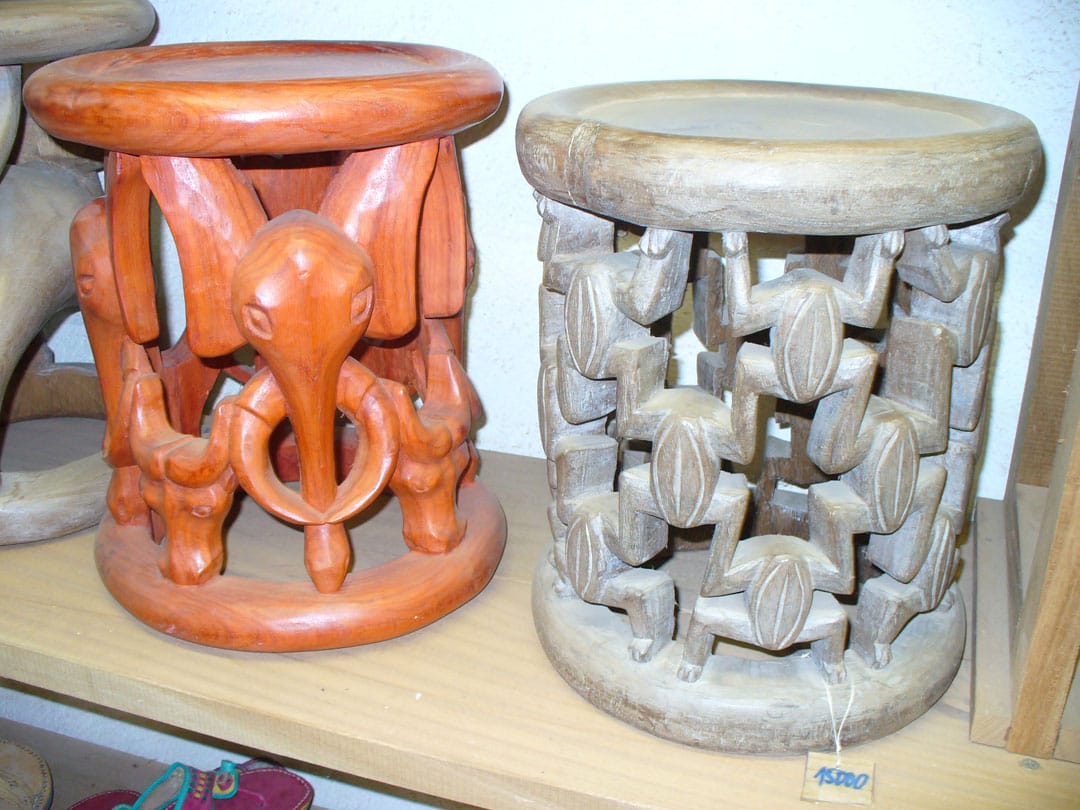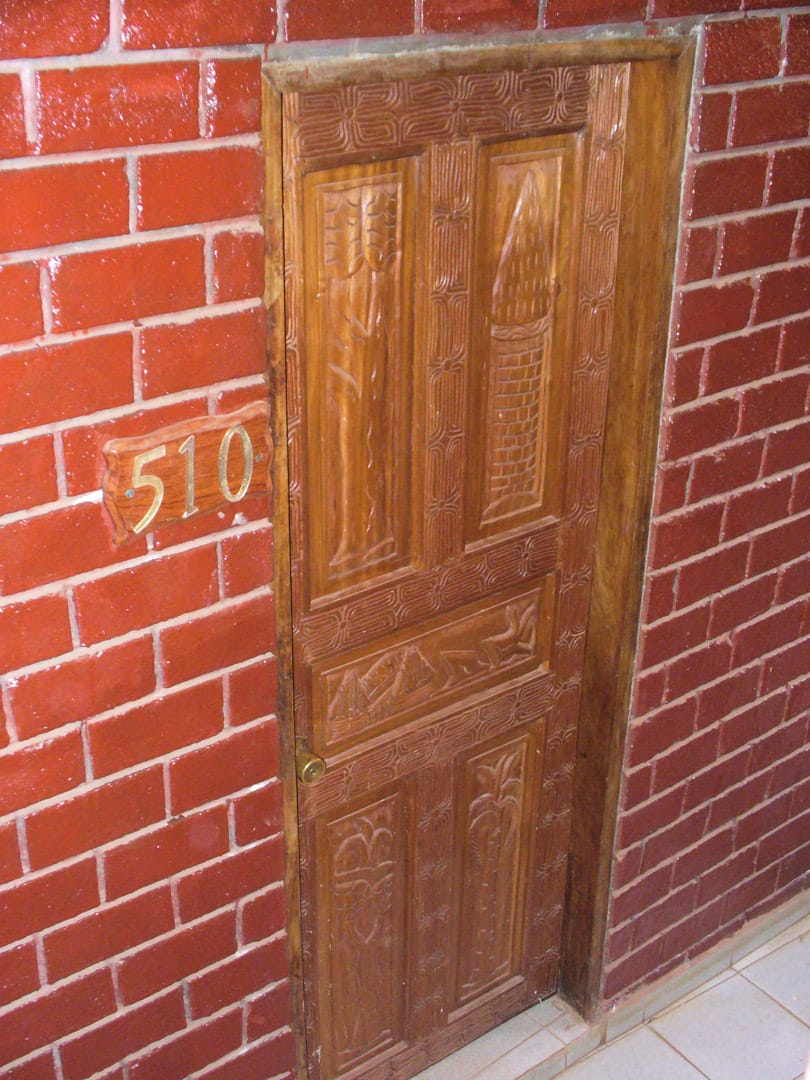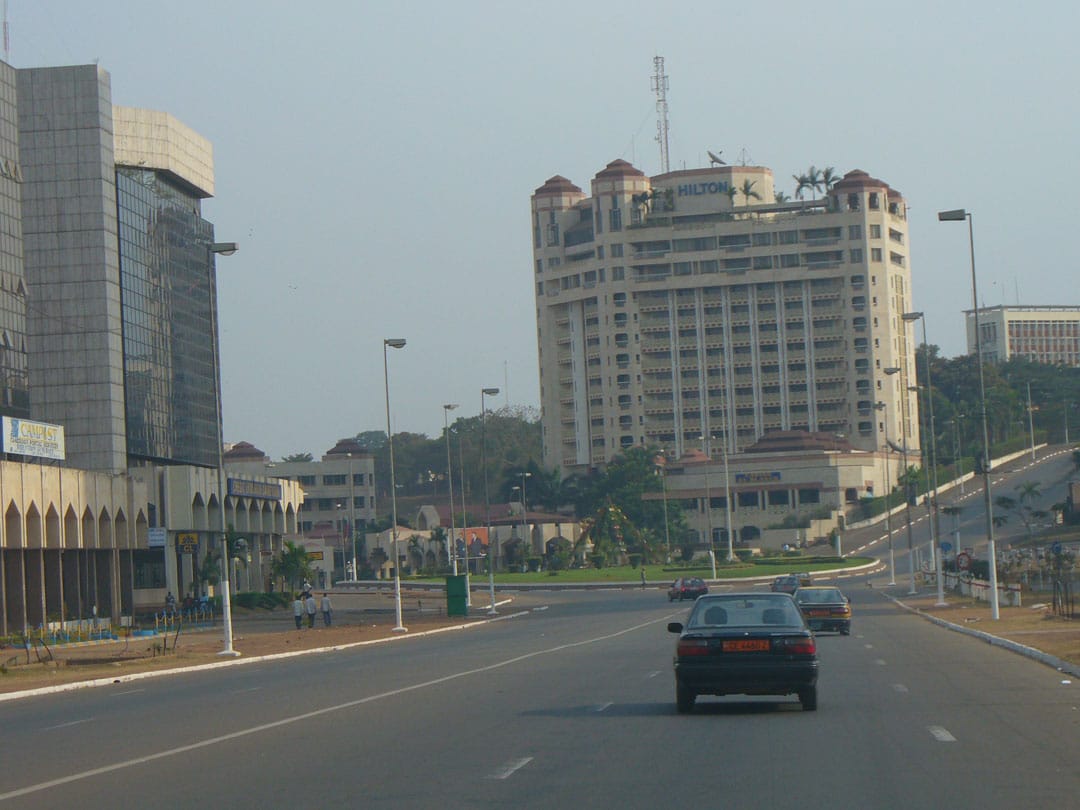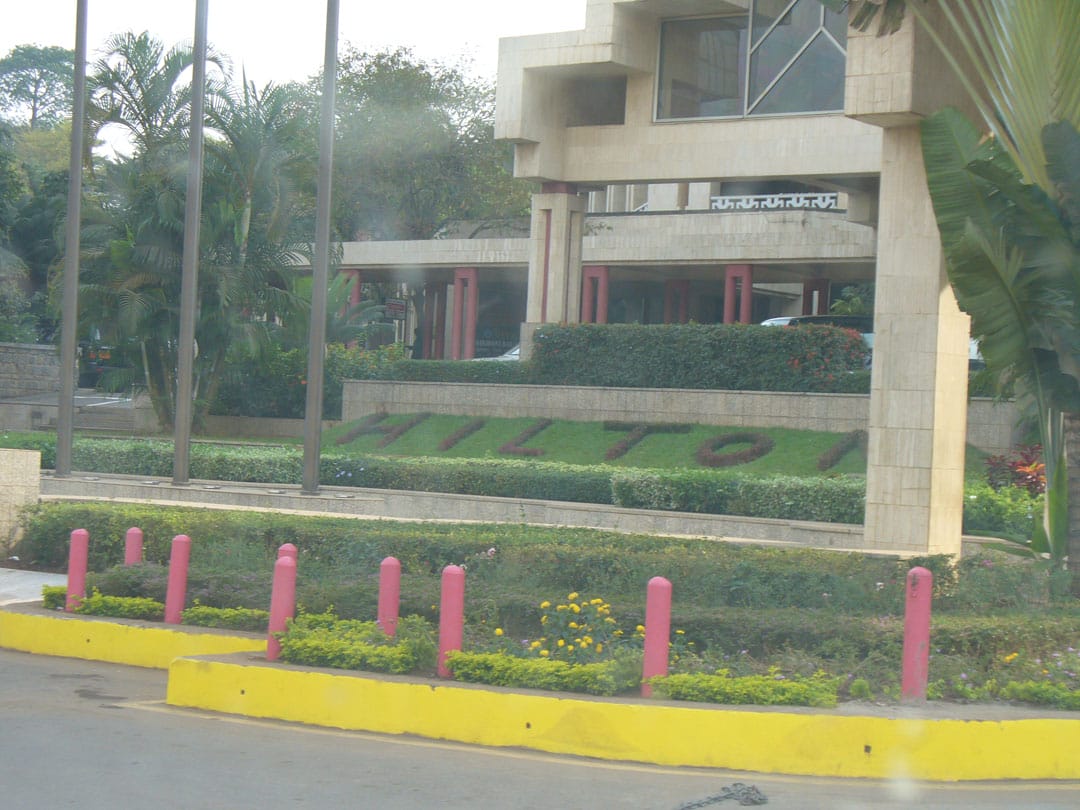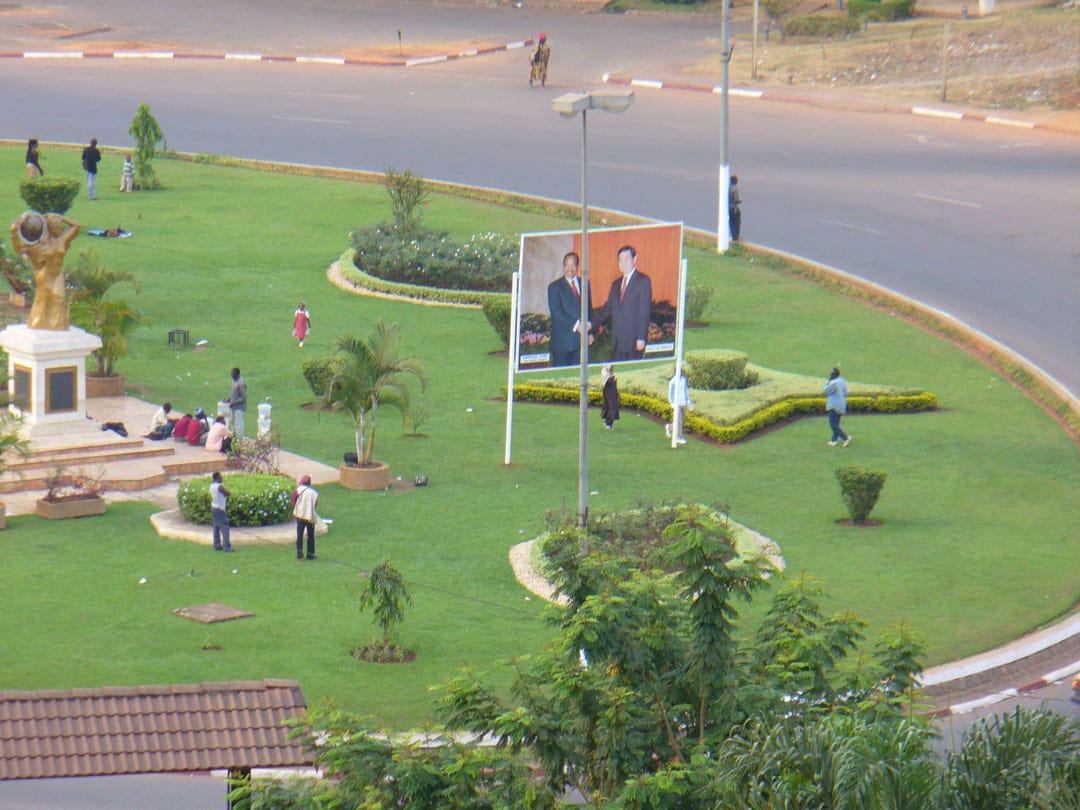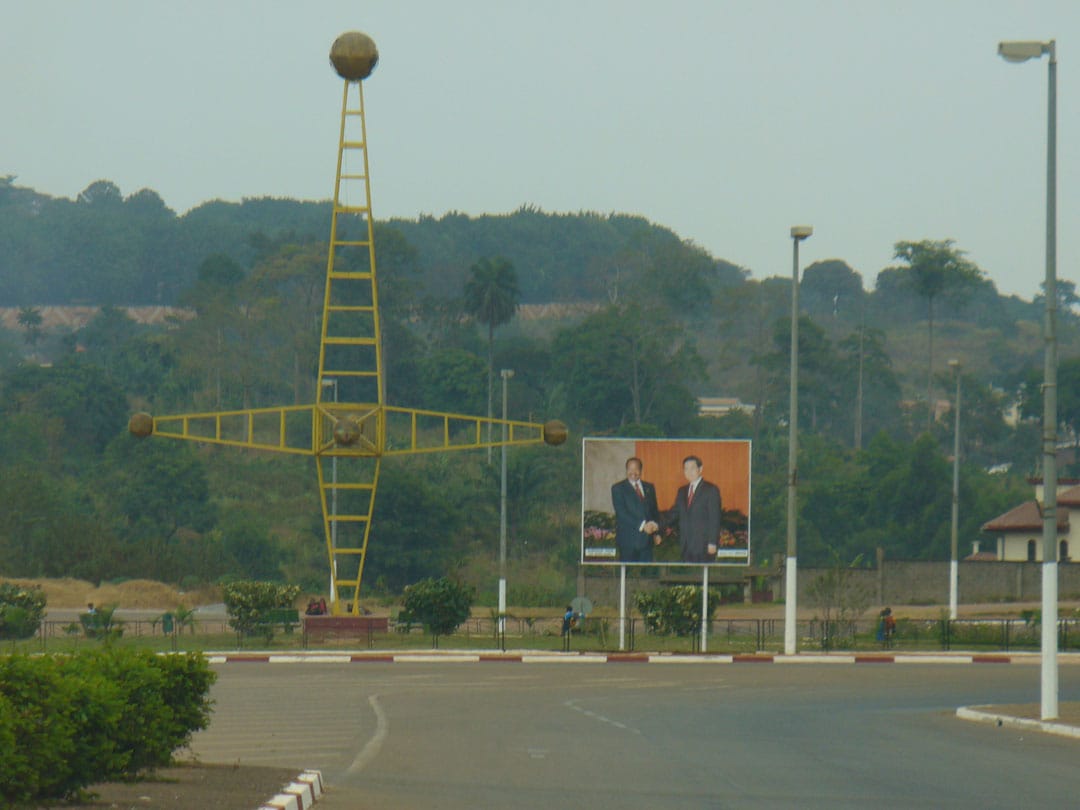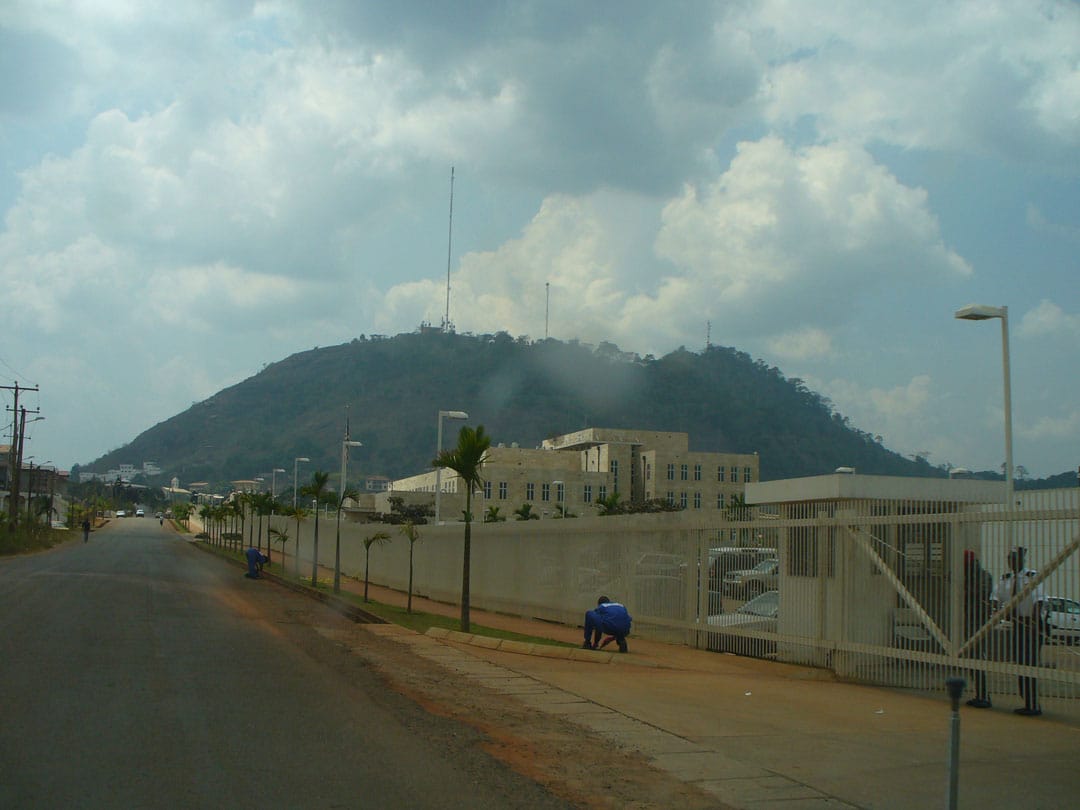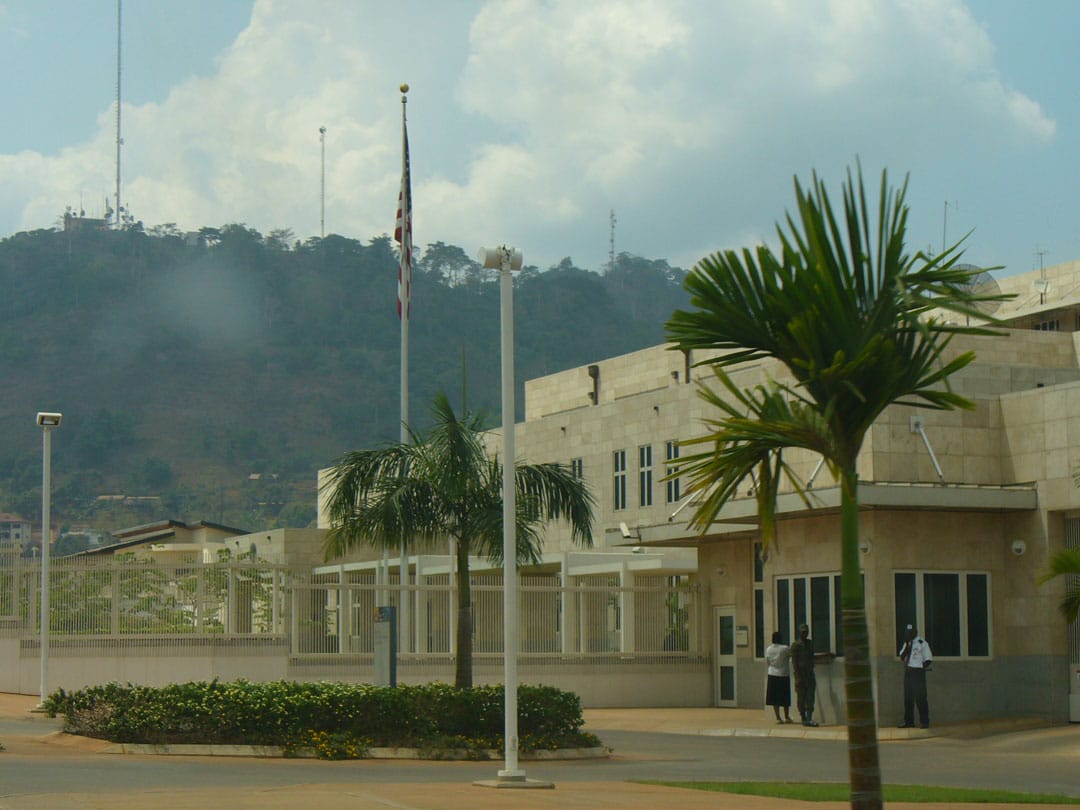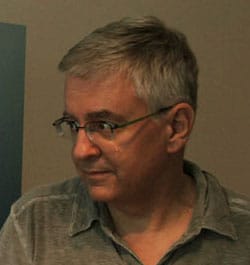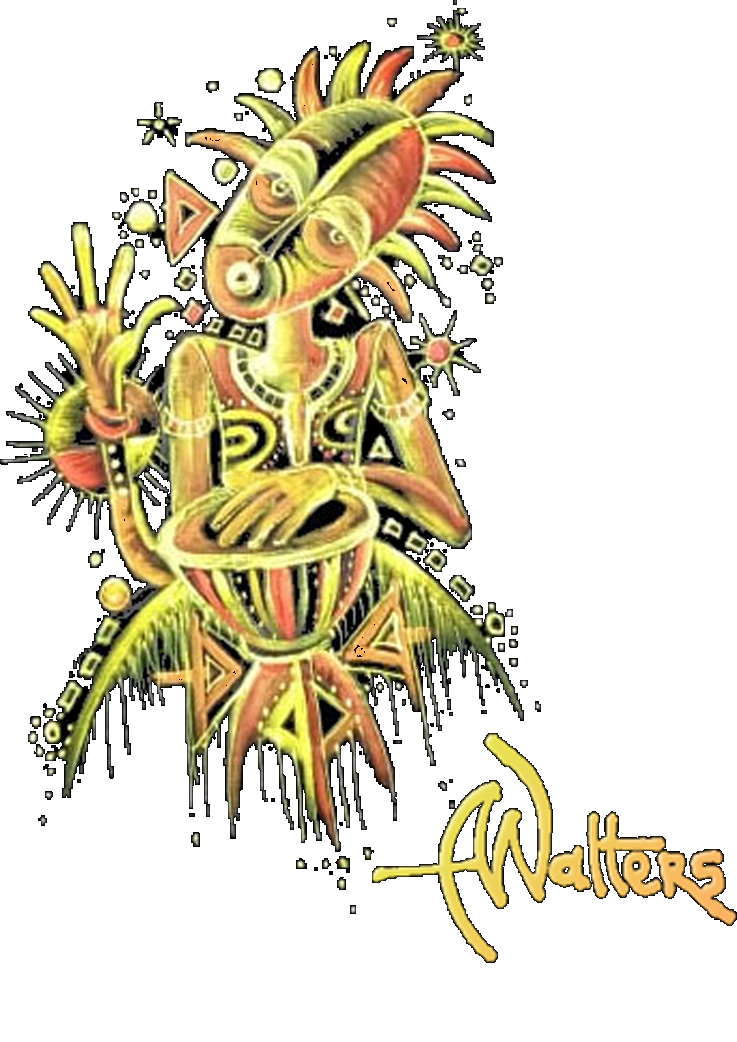Cameroon Road Trip and Meeting Angu Walters
In this chapter, we go on a road trip a ways into the interior of Cameroon. This is the best chapter because this page is where I meet Angu Walters and it changes both our lives. And I depart Cameroon to travel to Mt Kenya for three weeks + then three more chapters.
Driving to the NW Province, Cameroon : February 2, 2007
Road Trip
At the gas station on the way out of town we are mobbed by people selling Rolex watches, Louis Vitton shoes. They insist the items are fully genuine and we laugh at them.
On the road I learn there has been an accident with one of the new buses. It was run off the road by a logging truck. Nobody was hurt, because they were wearing seat belts. It’s important to Cameroon for the new bus system to succeed.
We pass a lot of cattle being herded along the side of the road. Amazing how little concern there is for public safety here. And I can’t get over how close the pedestrians are to the side of the highway. Along the highway there are pedestrians in view always; and sufficient space for them to walk safely only rarely. I have no idea how we have avoid bumping into one of them (that is – so far; knock on wood).
Sometimes we pass a truck and it doesn’t matter that a motorcycle is coming from the other side. So then we’re three vehicles side by side plus the pedestrians. Repeatedly, I make sounds of gasping or other urgent sounds. “No! No! No! No!” I’m afraid that Rob has gone more than a little native in his driving habits.
At one point we witness the bus in front of us – filled with passengers and piled way high with their belongings – pass the truck next in front. At that point a Mercedes arrives from the other direction. Now all three vehicles are side by side in two lanes, only barely avoiding a collision which would have caused a large number of deaths.
OTOH, Rob feels that it’s not such a bad thing to run the M’benzis off the road.
So many pedestrians along the highway are carrying machetes! They seem to have a lot of important uses, such as collecting food from the jungle, collecting firewood, clearing brush, smiting enemies(?). I wonder that most Americans are able to get by without owning one.
It seems the top government ministers here are required to pay the president a kickback for holding on to their jobs. The ministers collect payments from those close to themselves, and the pattern continues on down the line. It’s a hideously corrupt system that results in all kinds of problems and deeply entrenched poverty.
My friend Iris, way over in Kenya, frequently uses an expression “Africa wins again,” but over here they’ve got a slight variation. They say WAWA. West Africa Wins Again. Very apt expression in many different circumstances. Everything you want to do here is at least difficult – and most often it is impossible.
There are more police check points along this route than elsewhere. They can’t hope to control the porous borders so they aim to control the highways instead. They’re looking for trucks loaded with smuggled goods – this results from the high tarifs the Cameroon government charges. They also like to stop the small buses and look at what’s being transported, as well as to demand to see everybody’s I.D. If I didn’t have my passport I could be arrested. More likely, I would simply pay a bribe. In a diplomatic vehicle I’m not going to be stopped at all.
Have I mentioned this? The police enforce their checkpoints with boards filled with long nails. A rope is tied to one end and they can pull it out in front of a passing vehicle if necessary. Primitive but, presumably, also effective. I would like to have photographed these checkpoints – but that would violate my rule against photographing people who are holding rifles.
Our initial destination is the city of Baffousam in the Western Province but we’re not stopping there. We drive through and then drive northwest into the mountains of the North West Province, which is the other English-speaking province besides the one where Mt. Cameroon is located. The mountain jungle landscape is fantastic. We’re going to spend the night in Bamenda.
A while later, there is a stretch where they’re all trays of what look like pure white rocks. And other times whole tarps laid out with them. We’re so curious that we call a Cameroonian for an explanation. It’s manioc root, or cus cus. I don’t exactly know what that is. I should look it up.
Later still, we pass through what is evidently the carrot growing region.
Unfortunately, as we get nearer the city we notice more and more fires. They’re burning fields. Lots of them. Interestingly, the fires seem mostly to be tended (if at all) by boys of about the age of 12. The smoke adds to the dust and the visibility is greatly restricted. Again and again, Rob remarks how this or that view is normally spectacular.
I comment on the shady looking money transfer places. Western Union is often advertised here but there are also these small scale places. Rob says they’re important and widely used. He says sometimes a robber will get onto one of these crowded small buses and take everybody’s money. So travelers often use these services to send their money ahead of them. You pay money at one place, and tell them where you’re going, and they tell you a secret PIN number. At the other end, they’ve got your money and they’re expecting you. Simple. Effective. Safe.
Here is a view of Bamenda from the steep road leading down from the mountains. Much dust and smoke.
There are poles with street light lamps but none are lighted. And, even in this darkness, there are few headlights in use, even by motorcycles.
Our hotel is big and sort of grand, though it’s clearly seen better days. The parking lot is so dimly lighted. At least there is a security fence and a gate with a guard here. Inside the hotel, I’m amazed that the hotel lobby is also dimly lighted! I’ve never seen such a thing before. This is so weird. But it’s because electricity is so expensive.
In the gloom, I notice the ever-present photo of the dictator above the reception desk. It’s always the same old photo of the dictator as a considerably younger man.
We stop in at the bar and discuss the safety of the ice cubes they use here. The safety of drinking water (including ice cubes) is always of the greatest concern in this sort of country. They swear that the drinking water here is clean and therefore so is the ice. But I have my doubts. I stick to beer. In Douala, the restaurants frequented by the expats make their ice from bottled water.
We are told that the fires are set in order to make way for new grass for the cattle and other livestock. It’s near the end of the dry season and so this is the perfect time for it. My bad luck.
Later we’re in the restaurant of the hotel – where all of the patrons happen to be white. Our waitress brings us bilingual menus (English and French) which are handwritten. Labor is cheaper than a copy machine. By now I’ve noticed a couple of things. First, most of the women working here are wearing wigs. We’re talking wigs shaped the way a white woman’s hair might be styled. It looks so very wrong to me. I actually hate it a lot. But it’s the local fashion. The other thing I notice is that I think I liked it better when I was dealing with Cameroonians who only spoke French. They were easier to understand than these Cameroonians whose primary language is a form of English.
There is an awful lot of burning going on in Cameroon this time of year.
Bamenda, Cameroon : February 3, 2007
A Day in the North
First thing I notice the next morning is they’re burning even right up against the property of the hotel. Do they graze their cattle right here, too?
The shower has to run for 15 minutes before it gets hot. Happily, water is plentiful in Cameroon so water conservation is not an issue.
Then it’s breakfast time. Rob swears they make the best food here at the Dreamland Restaurant. I am so skeptical. We sit by a window with raucous music blaring from across the street which is even louder than the very loud television playing on the opposite side of the room. The waitress (with fake hair) is quite dim and annoying. And our omelettes are slow in coming. I suggest that we just leave. Rob counsels patience and it turns out the omelettes are truly great. I think the best I’ve ever had. I am humbled.
Next, it’s time for some shopping. Oh, this is just too good to be true. Imagine, if you can, a shop where the prices are displayed right on the merchandise. There is no haggling, no need for either the buyer or the seller to scoff loudly at the price proposed by the other. No need for me to walk away and listen for the merchant to call me back with an improved offer. The clerk answers questions but doesn’t linger one moment longer than her presence is desired. And, best of all, there was only the one clerk – my presence did not attract a mob of people trying to sell me something. I’d almost forgotten that there were such places as this.
Without any frantic sales people bothering me, and driving me away, I end up spending about $100 on a lot of little things. It’s a complete pleasure to shop here.
We get a good laugh from this alter of the M’Benzi tribe.
He’s just off of a fairly major street, in back of some shops through a narrow alley. Inside the courtyard, there are children playing and some laundry hung out to dry. Angu greets us warmly. His workshop and home together are just two small rooms. But everywhere there are paintings – every wall of both rooms is covered with them and there are many more of them stacked. This place is a treasure trove.
Angu’s manner is self-effacing and shy. I’m thinking that if he were more confident and assertive then the walls would be less filled with treasure, he’d have sold more of them. And he’d have more wall space to begin with because he’d be rich. He should be rich!
I choose a painting called The Flutist mostly because I especially like the colors. I think I could be just as happy with any of a dozen others. I tell him that I’ve got a friend in Kenya, Iris, whom I will visit in just a few days. I promise to show her this painting and I explain that Iris owns the Mount Kenya Art Galleries where she sells art to tourists. For many years she has dedicated herself to, among other worthy projects, the promotion of new African artists.
Angu promises me – twice, and in no uncertain terms – that if Iris accepts my painting for display and sale in her gallery then he will paint me something similar and send it to me by DHL.
I’ve got his phone number and his email address. He uses an Internet cafe with high speed access, he will email photos to anybody with a serious interest in his work and can accept payment with Western Union. He’ll ship by DHL. I may save my pennies and buy some more of these after I get home.
Now we leave the city and head for a part of what they call the Ring Road. Some of it has become impassable but it’s beautiful out there. As we get further from the city I notice that the people, especially the children, show a special fascination upon seeing us. White faces are few and far between here and their eyes go wide. I’ve heard that it’s common for children to come up and wipe a white person’s arm to see if they really are this color. With so many albinos in this country, I find that surprising but I’ve got independent reports so I guess it must be true. I wave and smile and they’re delighted.
We end up following a paved road that becomes a narrow dirt road with the jungle close and high on both sides of us. I’m watching for monkeys but, unfortunately, I don’t see any. We listen to Davey Jones’ Monkeys on the MP3 instead (which seems to us perfectly hilarious).
We stop and listen to jungle sounds and wander a little ways from the SUV. I’m sure there are venemous snakes and who knows what else very close to me here.
Motorcycles are approaching and I step a lot closer to the SUV. A healthy fear of machete-wielding robbers is more than mere paranoia here. I could almost swear that one of them shouts “Yum Yum!” as they pass, but that really might be paranoia. We’re mostly sure that there are no cannibals around here. Mostly.
We were curious where this little road might lead.
We pass a one-lane side road which, for no particular reason, happens to attract our curiosity. So we decide to turn around and drive along it. By the time we get back to it we’re surprised to see an old man has appeared walking out this road. We ask him, in English, if we can drive here. He understands the words but he is clearly confused as to why we would want to drive here. He tells us it only goes a short way but we get the idea that he doesn’t object if we drive here so we drive on. Now we’re really in the jungle.
One more quick stop to see the workshop where a lot of the things on sale at the shop this morning are made. It’s in a town called Bali. There is a young man here from Switzerland who has worked as their accountant for a year. It’s got something to do with the Presbyterian missionaries. He’s leaving for home tomorrow. I’m amazed that he has not visited home at all in the past year! Civilization will be a shock for him.
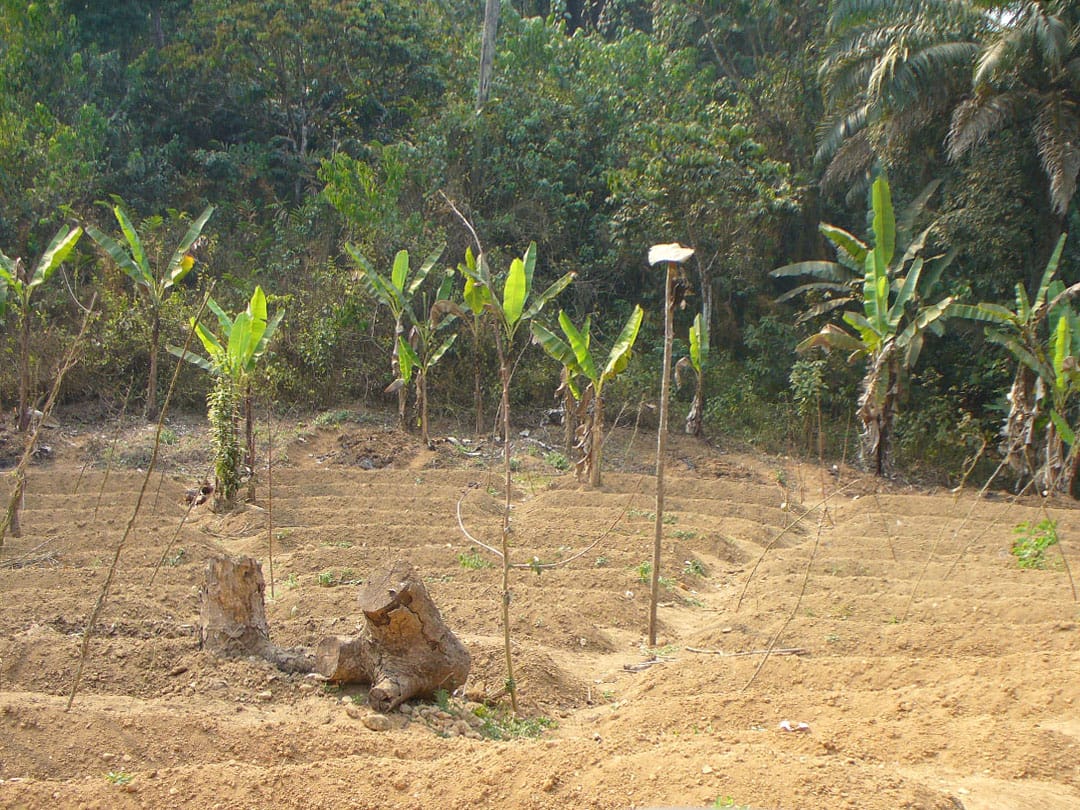

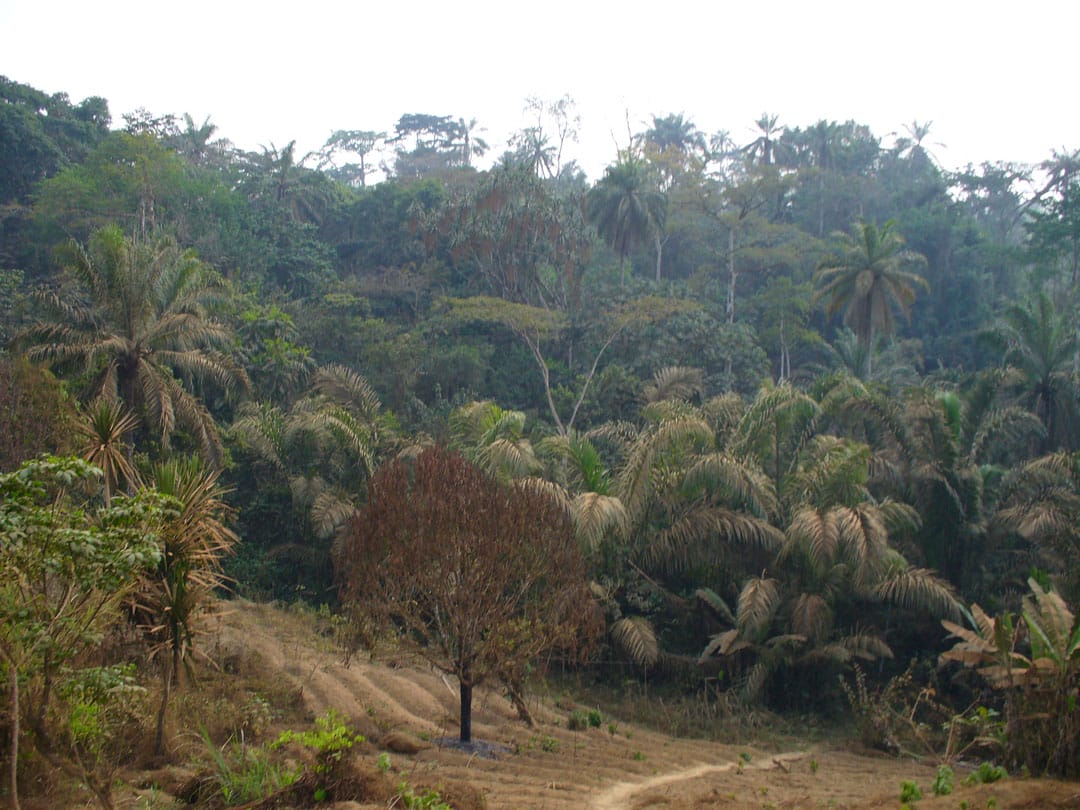
When he first arrived here he was often sick throughout his first three months. Malaria, among other things. I’m glad I still feel perfectly well, not counting the minor nuissance of sore throat and coughing because of this dusty air.
Now it’s getting late. We want to arrive in Foumban before dark, which means driving back through both Bamenda and Bafoussam. As it happens, we only get as far as Bafoussam and have to stop for the night. It’s not safe to drive at night.
We check one hotel and it seems adequate. We notice it because there is a white person in front talking to somebody. It’s kind of embarrassing that this is the most reliable way of telling if it’s a hotel we could bear to use. But what else are you gonna do?
Excessive woodcarving:
Foumban, Cameroon : February 4, 2007
A City of Masks
Sunday morning the hot water takes 15 minutes to arrive through the pipes. And then the power shuts off before we leave. Not such a very nice place after all. But, still, we have breakfast here. It’s a buffet, like the dinner. I stick to juice and croissants.
Foumbam isn’t far. It’s where everybody says all the masks are made. But before we visit the mask shops we first we need to go visit the Sultan’s place.
I’ve heard about him a lot and now I get some more of his story clarified as we’re driving. He’s a hereditary ruler in this part of Cameroon and he’s got a sort of modus vivendi going on between himself and the government. He’s got about 8 wives. I’ve met one of them at the American school in Yaoundé where she works.
It’s apparently a very remarkable thing that they’ve got their own written language here, along with their own written history. The history is only about 200 years old – and yet even that is unique in all of Africa.
We park our diplomatic-plated vehicle on the grounds of the Sultan’s deteriorating palace and go to visit the museum. I am not allowed to take photos in here. We’ve got a tour guide who shows me things like jewelry that includes “teeth of the sultan’s enemies” and some garments that have woven into them “hair of the sultan’s enemies.” Later I find complete jawbones of these departed enemies. We don’t spend long here but I do buy some mask keychains that I think are clever.
We walk around the market for a while, steering well clear of the area where you can probably get Avian Flu free along with your purchase of a live chicken.
The first market is pretty terrible. I buy some terrific things but I just about have a panic attack by the time we’re leaving. Mobbed again.
The second market is better. Rob and Claude tell them I’m a very delicate American and I will run away if they’re not careful. I think it helps.
We’ve got to hurry on to Yaounde, and arrive before dark. It’s a long drive. I decide that I must run across the parking lot into just one or two more shops before we go. As I approach, I see the men rising to mob me. It’s so depressing the way they do that. I beg them to leave me in peace. In the first shop – it actually is numbered as the first – the dealer tells me he is a son of the sultan. I imagine that is probably true.
In the second shop I find a big black mask that I like very much. I end up paying $24 for it after some half-hearted bargaining. I’ve got seven masks now and this newest one is my favorite. Rob says a lot of people get home and put their masks in the freezer for a month, or even more, so as to be sure of getting rid of any termites. I’ll worry about that when I get home.
We pass through Bafoussam for the third time on this trip and stop in the middle of the market area to say hello, again, to our French chef friend. We are at least 150 miles from Douala and we bump into a friend. Freaky. His mother is visiting and he’s showing her around the country. She seems happy in the middle of this utterly frantic market atmosphere. Good for her!
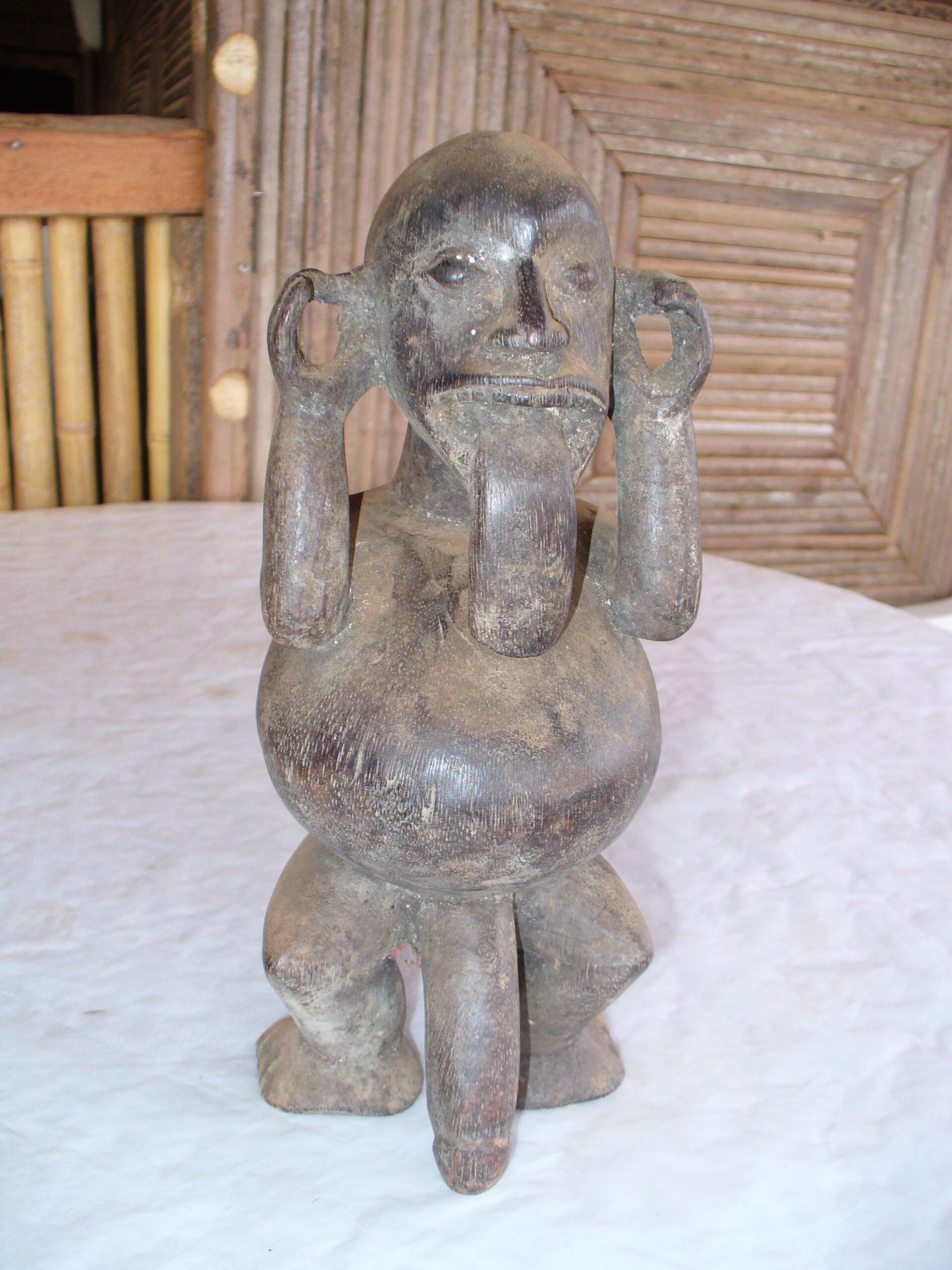
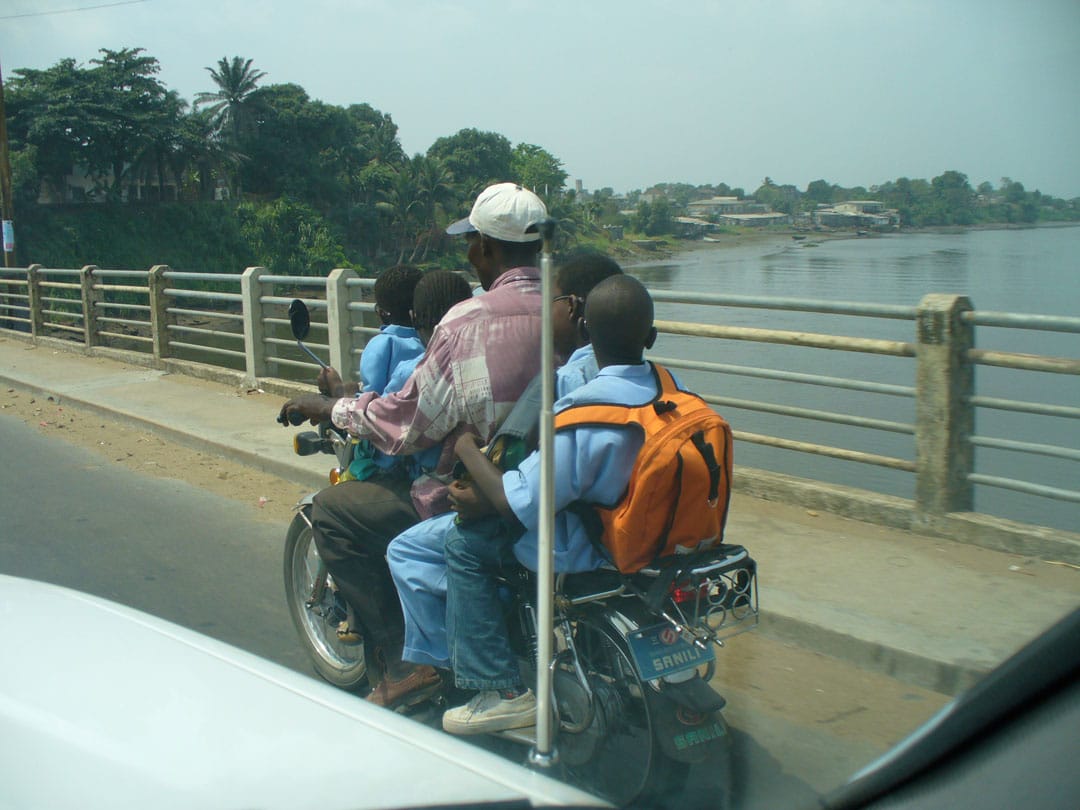
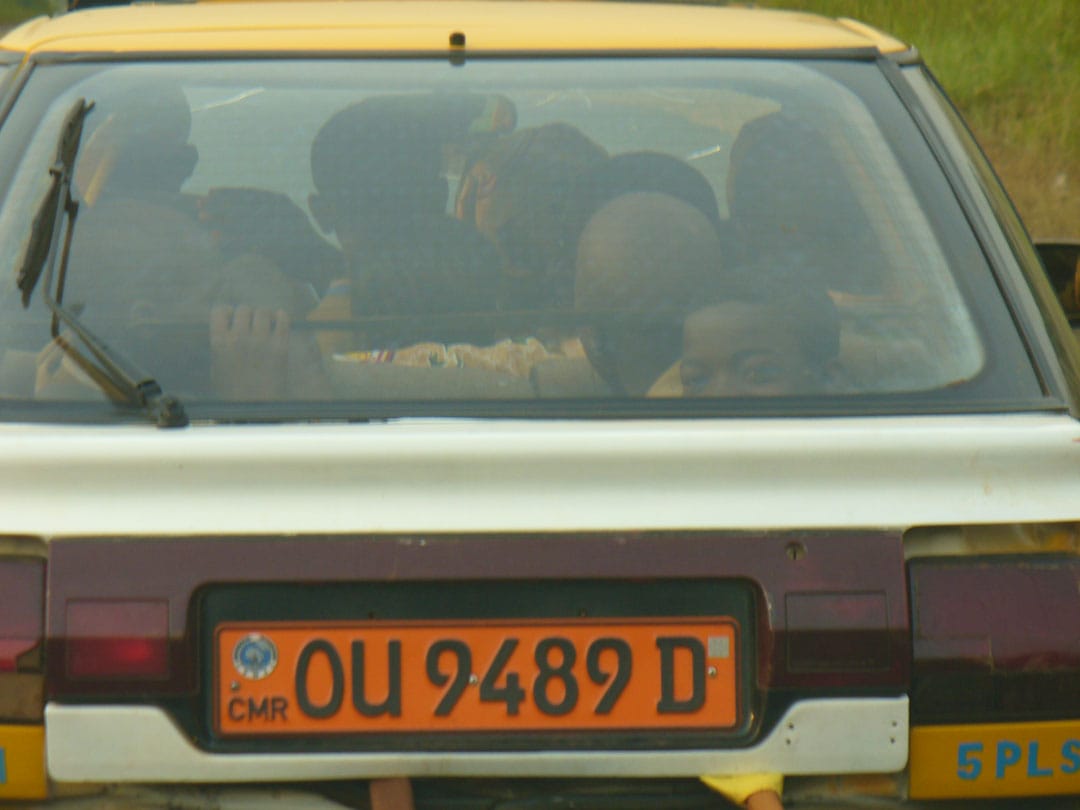
It’s a long drive to Yaounde but it’s a beautiful route. I sleep some of the way. I wake up for a fine looking bridge, except it’s got speed bumps all across its considerable length. The lanes are especially narrow so I guess they’re needed. And even with those, there is much evidence of drivers having lost control and run up onto the sidewalks and crashed into the side of the bridge. In a couple of cases, perhaps clear through the side of the bridge and into the river.
In a normal country, such a beautiful river would feature fabulous hotels and homes along the banks. Here, it’s only the fabulous jungle, mostly undisturbed.
China is busily bolstering its relations with countries all over Africa. They are promising roads, hospitals, and in one case even a new presidential palace to countries that will line up with them at the U.N. They’re also offering protection against international sanctions for their human rights violations. China expects duty free imports and, perhaps, the right to move millions of Chinese immigrants here. China’s got big plans for Africa.
Rob and Claude are meeting the president of the American bus company in the upstairs bar. I take a shower, and take some pictures from the balcony. I replace the batteries with some Chinese-made batteries I bought on the highway and, whatduyaknow, they’re dead. The expiration date is next year sometime but they’re all dead. So I decide to go to the lobby for batteries and to plug my laptop into the Internet in the business center.
At the desk, I explain – in my improving French – about needing batteries and I mention that my Chinese batteries are no good. They laugh at me – gently, sympathetically, but still… It seems that I am among the last in Cameroon to know that it’s a waste of money to buy Chinese batteries. Unfortunately, there are no batteries of any sort to be found in or near this hotel. And the business office is closed. And there is no wireless available, though they’ve been intending to get that going for a few years now.
Now I’m feeling quite frustrated and as I’m entering the elevator I’m deciding whether to go to the room or to the bar when I hear my name. It’s the woman from the Centers for Disease Control (measles project). She is just heading to the front lobby to meet the guy from the World Health Organization for dinner. She tells me how fed up she is with West African men and their condescending attitude toward women. I think she’s reaching a breaking point. She hates her driver.
They invite us to join them for an Ethiopian dinner but we can’t, we’re having a home-made Moroccan dinner elsewhere!
He’s been here for 18 months, during which time he has made frequent trips home to be with his wife and young children, and to meet with the investors. He is somewhat the worse for wear, on account of the difficulties inherent to dealing with a government like this one but he’s very enthusiastic still.
They’re not paying bribes to government officials and Rob suggests some some acceptable workarounds that will help to smooth the way. Parties, honorary directorships, free bus passes. I hope it helps. They’ve had so much trouble dealing with the Cameroon government. In North America when you need to form a new corporation you can do it all online one day, and your new corporation is all good to go the next day. Here, it takes many months and you’re lucky if the government ever gets around to fulfilling its duties.
Another problem here is almost everything is done in cash. This looks extremely strange to a non-Cameroonian banker or accountant.
The company president is more than pleased with the way things have turned out following the recent bus accident. This being such a very dangerous route, an accident was bound to happen sooner or later. They had planned how to respond in various circumstances. As it happens, the driver’s training paid off. Faced with logging trucks coming at him in both lanes he had no choice but to drive off the road. The only injuries were to the driver himself, broken legs, but he is in excellent spirits and is treated by all concerned as a hero. Press has been highly favorable, treating this accident as extraordinary good news.
We’re all invited to dinner at the home of a couple who both work at the Embassy. They’ve been here only three months, following a posting to the Embassy in Vietnam. She is from Morocco and they have a young daughter. Their nanny has a degree in History but can only find work as a glorified babysitter, but she’s happy and the family feels lucky to have her. The dinner of Moroccan lamb is great.
While Rob is working on that I take some things out to the SUV. I’m fascinated by a conference just letting out – it’s all kinds of extremely well dressed Africans. I can’t resist snapping one quick picture. Somebody asks me why I’m taking pictures. I just sort of mumble and try to move along. I’m nervous. But it turns out he’s only a journalist wondering if I am a journalist also. Whew!
He’s from Mali and is wearing such a fine and expensive suit. We chat and I learn that the conference concerns efforts to improve education in Africa. Eventually, he mentions something about 1000 francs. I’m not sure that I understand him correctly and so his friend assists by translating to English. I did understand correctly after all. This M’benzi in such a fine suit is hitting me up for $2. Sigh. I go back in and look for Rob.
On the way out we bump into our CDC friend once more. It must be a very small country that this sort of thing can happen so often. She greatly admires my painting and takes down the artist’s contact information. We have interrupted her composing a report containing various recommendations to the CDC.
She has observed that when she arrives to a CDC office where the boss appears busy then the success rate is much greater. If she finds the boss with his or her feet up on a desk watching TV then there is not nearly such a good success rate. Imagine that.
She is still angry about that driver and she’s got some advice on that point too. Maybe the CDC will end up with all women drivers. And no TV’s.
Rob’s got to see some people at the embassy. I am granted a visitors pass but Rob must keep me under surveillance at all times. First, he’s got to see the nurse about his blood pressure medication and a weird tropical rash that’s slowly coming under control. All is well. I can’t help noticing that there is a very big bowl of condoms in the office.
He’s got a meeting with the DCM – Deputy Chief of Mission, right under the Ambassador – up in the super secure section of the embassy. Rob uses his secret code to enter this area and I am deposited in the care of our Moroccan-born hostess from last night. (Somebody has to watch me at all times while I’m in this area.) I notice that the filing cabinets all have big combination locks on them. I wonder what secrets we’ve got from the Cameroonians. My guardian gives a vague answer when I inquire about that – just as I had expected.
She tells me that one good thing in this country is there is generally always a support system from one’s extended family. It’s similar in Morocco. Where I might introduce myself simply as “Chuck,” in her home country this would not do at all. She introduces herself to Moroccans including her family name first, and the daughter of somebody from the village of somewhere. Lots of ties. For good or ill, and for Cameroonians it’s similar.
But I once read something about how it’s nearly impossible to grow a small business in Africa because you can never get together sufficient capital. As soon as you’ve gathered a little money then there all your relatives show up with their hands out, and so there is not the sort of expansion of successful business enterprises that you might otherwise expect. She concedes that could be a serious problem, the downside of this sort of social system.
On the way out, I get around to learning what all the Rosa Parks material on the wall of the reception area is for. When the U.S. Embassy purchased this land the government offered the USA the opportunity to choose a new name for the street. The name Rosa Parks Ave. was selected. And so that’s why we have pictures and information describing what an important figure she is in recent U.S. history. It’s nice I think.
Before leaving town, we pick up some good American batteries at a store and go next door to a Lebanese cafe for a light snack. Rob introduces me to the owner – he knows so many people here! – and I indicate my approval of the place with an OKAY hand sign. I am immediately so embarrassed because I remember that this gesture has a totally different and most unpleasant meaning to the French, something on a par with the raised middle finger in the USA, and I wonder if that understanding of the gesture has traveled to Lebanon and Yaoundé, or not. I hurriedly add my verbal congratulations on owning such a very nice place. So many cultural differences and so difficult to keep track of all of them.
As we get back into the SUV, Rob finds some coins to give to a particularly pathetic beggar. He comments that in Cameroon such donations comprise the whole of the social security system.
I assume that having come this far, we are bound to die on the highway to Douala. But we arrive alive. I am genuinely very surprised.
I first check email – for the first time in more than 3 days – and then make a dash to the crafts market around the corner. I pick up some more of those batik cloths and some giraffe salad fork/spoon sets. It’s a typical horrifying experience. I am practically mauled by the vendors. Walking through the aisles I can see them rising to greet/assault me as I approach. They stand in front of me pointing in to their displays, begging me to look. And if I do go inside, then twice they block my exit. They could hardly make it a more painful experience to shop here if that were their goal.
In addition, there is a small group of beggars passing through. They appear to be refugees from Chad. Some children with an older blind woman, perhaps their grandmother. The children are holding out their familiar beggar bowls.
I came to Cameroon with my laptop in a small case, a duffle bag, and a suitcase. I’ve added another small bag. Somehow I manage to fit all of my things – both old and new – into the bags. Rob has called his friend at Kenya Airways and has secured an upgrade to First Class. I love that. Now I’ll be able to carry my laptop, my painting, and my new small bag as carry-on and nobody will bother me.
While I’m packing, Rob has been hosting a Super-Bowl party. The game ended about 12 hours earlier but it’s being rebroadcast on satellite. Some guests know the final score, some don’t. It’s not discussed. There are special difficulties for a sports fan here on the far side of the world.
Back in Yaoundé, the DCM – second in charge of the embassy after the Ambassador – hosted a Super Bowl party for any interested Americans at his home. It went until 5am earlier today. And embassy employees got a special dispensation to come in late to work today!
Rob drives me to the airport and promises me that the departure side is newer and looks better than what I saw on arrival. Frankly, I don’t see a great deal of difference. I am not fussy about such things but this place is a dump.
Rob reminds me that his party for “vendors” is coming up later this week and everybody he deals with at the airport has by now received their invitation. And it shows. We are greeted enthusiastically by a variety of officials.
I pay 10,000 CFA to leave the country – $20. I don’t know who is getting that or why, but it’s less than I paid to leave Haiti.
The First Class lounge is very nice. I’m surprised! Up until now I said that even the airport in Port au Prince, Haiti is clearly better than Douala – but this lounge is terrific. Very comfortable. And better than Haiti. I sort of wish that we’d come earlier so that we could linger longer. We help ourselves to some free wine. The Kenya Airways people speak English and so the time has come for me to try to break the habit of addressing people in French.
After getting my bags inspected and a metal-detecting wand waved all over myself, I say goodbye to Rob and board the plane. Ah, it’s beautiful in first class! (I think it’s technically called Business Class – whatever, they serve me champagne as soon as I sit down!) It’s good to have friends of friends who help to run airlines!
A few weeks later, this same Kenya Airways flight crashed on take-off, killing all aboard.
Leaving Cameroon, my main feeling is I’d have liked it better if both the roads and the drivers were better. That was always my biggest annoyance. And I’m so glad that – so far – I don’t appear to have contracted any exotic tropical diseases. I didn’t find much cause to feel hope for the country. I don’t see any reason to expect that they will get themselves on track toward social and economic development any time soon but I’m glad at least I didn’t see any evidence at all of hunger.
One unqualified positive thing to say about Cameroonians is that they sure have nice art!
Douala, Cameroon : February 5, 2007
Leaving Cameroon
Check out takes a long time because the hotel’s credit card processing system doesn’t work. It’s been broken for months. And this is the Hilton, the finest hotel in the country. Go figure.
While Rob is working on that I take some things out to the SUV. I’m fascinated by a conference just letting out – it’s all kinds of extremely well dressed Africans. I can’t resist snapping one quick picture. Somebody asks me why I’m taking pictures. I just sort of mumble and try to move along. I’m nervous. But it turns out he’s only a journalist wondering if I am a journalist also. Whew!
He’s from Mali and is wearing such a fine and expensive suit. We chat and I learn that the conference concerns efforts to improve education in Africa. Eventually, he mentions something about 1000 francs. I’m not sure that I understand him correctly and so his friend assists by translating to English. I did understand correctly after all. This M’benzi in such a fine suit is hitting me up for $2. Sigh. I go back in and look for Rob.
On the way out we bump into our CDC friend once more. It must be a very small country that this sort of thing can happen so often. She greatly admires my painting and takes down the artist’s contact information. We have interrupted her composing a report containing various recommendations to the CDC.
She has observed that when she arrives to a CDC office where the boss appears busy then the success rate is much greater. If she finds the boss with his or her feet up on a desk watching TV then there is not nearly such a good success rate. Imagine that.
She is still angry about that driver and she’s got some advice on that point too. Maybe the CDC will end up with all women drivers. And no TV’s.

